FAQs
Common Questions About Personal Injury, Family Law, And Criminal Defense In Virginia
- All
- Bicycle Accidents
- Boating Accidents
- Bus Accidents
- Car Accidents
- Child Custody & Visitation
- Criminal Law
- Dog Bite
- Drug Offenses
- DUI/DWI Defense
- Family Law & Divorce
- Injuries to Children
- Metro Rail/Commuter Train Accidents
- Motorcycle Accidents
- Pedestrian Accidents
- Personal Injury
- Personal Injury and Wrongful Death
- Property Division
- Serious Traffic Violations
- Truck Accidents
- Wrongful Death
Dealing with injuries you suffer in a car crash can be a traumatic and overwhelming experience. If the other driver was negligent, it may be difficult to navigate the legal process and file a personal injury claim while coping with your injuries.
An insurance adjuster may call you within days of your car crash and request that you provide a recorded statement. However, before agreeing to provide one, it is crucial to consult with an experienced Fairfax car accident lawyer who can negotiate your settlement and protect your rights. 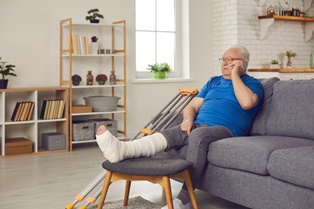
What Is a Recorded Statement?
A recorded statement is a tape-recorded session with the insurance adjuster. It may be taken over the telephone or in person. The adjuster asks questions about the accident, your injuries, and other relevant details. You need to understand that this statement can have legal consequences and negatively impact the outcome of your claim.
Why Is the Insurance Company Requesting a Recorded Statement?
The insurance adjuster may tell you that giving a recorded statement is standard procedure in the insurance company's investigation and settlement of your claim. However, that is not true.
The adjuster's goal is to save their employer money. They want statements they can use to deny your claim or pay you substantially less than the full value of your claim.
Why You Should Not Give a Recorded Statement After a Fairfax Car Crash
You don't want to make mistakes that damage your case and force you to accept less money in your settlement. Here are reasons why you should refuse to agree to the insurance company's request:
Reason #1: You Are Not Required to Give a Recorded Statement
The insurance adjuster may tell you a recorded statement is required to settle your claim. However, under Virginia law, you are not obligated to provide a recorded statement to the insurance company. Exercise your rights, and refuse the insurance adjuster's request.
Reason #2: Your Statements Will Be Compared to Other Statements
The insurance company will likely gather statements from all parties involved in the crash and those who witnessed it. They will also review the statements you made to the police, your doctor, and others. In addition, you may have to give a deposition later if the insurance company refuses to offer you a reasonable settlement, and you must litigate your claim.
The insurance adjuster and their attorney will compare your recorded statement to these other statements. Any inconsistencies or contradictions between your recorded statement and other accounts may be used to challenge your credibility and the severity of your injuries.
Reason #3: You Do Not Know How Serious Your Injuries Are
Immediately following an auto accident, some injuries, such as a traumatic brain injury, spinal injury, or internal organ damage, may not be apparent. In addition, you may not know the treatments you will need or how long your recovery will take. By providing a recorded statement before completely understanding the extent of your injuries, you may unintentionally underestimate or overlook their severity, potentially undermining your claim.
Reason #4: The Adjuster Could Ask Confusing Questions
Insurance adjusters are trained professionals who may ask you confusing questions in an attempt to elicit responses that minimize the at-fault party’s liability or weaken your case. If you agree to give a recorded statement, you may not understand what’s being asked of you, and you may be misled by the adjuster’s efforts to fluster you.
Reason #5: You Could Say Something That Hurts Your Case
No matter how carefully and accurately you try to answer the insurance adjuster’s questions, you might say something that could be misconstrued or taken out of context. The insurance company may use these statements to dispute your claim or reduce the amount of compensation they offer you.
Reason #6: Your Recorded Statement Can Be Used Against You
Once recorded, your statement will be transcribed into a written document. The insurance company will use any inconsistencies, contradictions, or self-incriminating remarks you made against you in settlement negotiations or court.
You could suffer devasting injuries if a negligent truck driver in Northern Virginia hits your car. If you were hurt in a truck crash and file a personal injury claim, you may wonder about the potential value of your claim.
Determining the exact amount you can recover in a truck accident is challenging, and it depends on many factors specific to your case. However, an experienced Fairfax personal injury lawyer can provide you with a realistic estimation of what your claim is worth. 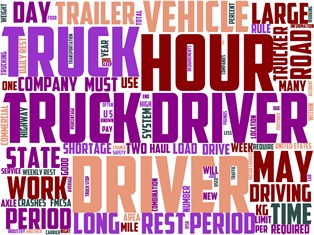
Damages You May Recover in a Fairfax Truck Accident Case
A skilled injury accident attorney will value your claim by first determining the compensation you could recover in a settlement with the insurance company. In a Virginia truck accident case, you can recover your past and future damages.
Possible Types of Compensable Damages in a Truck Crash
- Medical expenses. You can seek compensation for all medical treatment necessary for your recovery. Medical costs you can recover include hospital bills, surgeries, doctor bills, diagnostic tests, medications, rehabilitation, and mental health counseling.
- Lost wages. If your injuries caused you to take time off work, you may be entitled to compensation for the wages you lost while you were recovering. This can include weekly pay, lost vacation and sick time, bonuses, and benefits. If you must make a career change with a pay cut or you become permanently disabled, you may be able to recover for your lost earning capacity.
- Pain and suffering. Truck accidents often result in physical and emotional pain, mental distress, and a reduced quality of life. Your claim should compensate you for these non-economic damages.
- Property damages. If your automobile or other personal property was damaged in the accident, you can seek reimbursement for the repairs or replacement costs. Property can include a cellphone, laptop, child safety seat, and a pet that may have been injured or killed in the accident. Clothing, jewelry, and sunglasses should also be considered in the personal injury claim.
Factors That Affect the Value of a Fairfax Truck Crash Claim
Several factors can make a truck accident case stronger or weaker and can impact the value of a truck accident claim. Here are common factors that may affect how much you can recover in your settlement.
Liability
Establishing fault for the crash is a critical component in any personal injury claim. However, it’s especially true in Virginia. If you have solid evidence that the truck driver and trucking company’s negligence caused the crash, your claim’s value will be higher, and you may obtain a larger settlement from their insurance company.
However, if you share some degree of fault, even if it’s only one percent blame for the crash, you will be unable to recover compensation because Virginia follows a contributory negligence law. This rule says that you must not have contributed to the accident in any way to recover for your damages.
Severity of Your Injuries
The extent and seriousness of your injuries are significant factors in determining the value of your claim. If you suffered severe injuries that require extensive, long-term medical treatments or result in your permanent disability, this would significantly increase how much your case is worth.
Disputes With the Insurance Company
Insurance companies often attempt to minimize payouts by disputing liability, downplaying injuries, or undervaluing claims. A knowledgeable personal injury lawyer will have strategies to combat these unfair tactics and help ensure you receive the compensation you deserve.
It’s important that you don’t give the insurance company ammunition to dispute, deny, or delay your claim. Avoid making mistakes such as providing a recorded statement, signing a medical release giving access to all your medical records, or making damaging statements about the collision on social media sites.
Insurance Coverage
How much insurance coverage there is to compensate you can directly impact how much your claim is worth. If the at-fault parties have limited insurance coverage, it may affect the maximum amount you can recover.
There are approximately 2.5 million rear-end collisions each year in the U.S. They are responsible for approximately 28% of all crashes, making it the most common type of vehicle accident. Additionally, the National Transportation Safety Board (NTSB) reports that rear-end crashes account for nearly 1 million injuries and 2,000 deaths every year. Because it’s likely that every driver will be involved in a rear-end collision at some point in their life, it’s important to obtain the help of an experienced Fairfax car accident lawyer who can help you determine liability and get you fair compensation for your injuries. 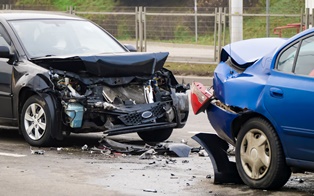
Liability in Fairfax Rear-End Collisions
Most often, the rear driver is considered to be at fault in a rear-end collision because they are expected to maintain a safe following distance from the vehicle in front of them. Typically, it’s the responsibility of the rear driver to ensure there is no back-end crash. However, there are many ways a rear driver can drive in a negligent manner that causes an accident.
Negligent Behavior That Can Cause Virginia Rear-End Crashes
- Speeding
- Distracted driving, such as talking on a cellphone, texting, or eating and drinking
- Drowsy driving
- Driving while intoxicated
- Driving a car with mechanical problems
How the Lead Driver Can Be Responsible for a Virginia Rear-End Collision
- Braking suddenly without warning
- Failing to use a turn signal before moving into traffic
- Driving a car with faulty or broken lights
- Reversing into the rear car
You should retain a skilled car accident attorney even if you believe that the other motorist’s liability for the rear-end collision is obvious. Their insurance company could still argue that you were partially or completely to blame for the crash or dispute the seriousness of your injuries.
How a Fairfax Car Accident Lawyer Can Help After a Rear-End Collision
Hiring a skilled, experienced car crash attorney is essential to help win your case and obtain the maximum recovery in your settlement. They can help you in many ways after a rear-end collision, including determining liability. A lawyer will thoroughly investigate the circumstances surrounding the crash to determine the at-fault party. They will review the police report, photos, and video of the collision and interview witnesses. They may also visit the crash scene and hire an accident reconstruction expert if necessary.
Other Benefits of Hiring a Virginia Rear-End Crash Attorney
- An attorney will value your claim. An attorney can value your rear-end collision claim. It can be extremely challenging to determine the past and future medical expenses, lost wages, and pain and suffering you should receive in your settlement on your own.
- An attorney will collect evidence. You must prove the other driver’s negligence, the seriousness of your injuries, and the damages you are entitled to under Virginia law. A Fairfax car accident lawyer can gather the evidence you need, such as police reports, witness statements, surveillance video footage, expert witness reports, medical records, and wage loss documentation, to win your case.
- An attorney will negotiate your settlement. A lawyer can negotiate your settlement with the insurance company. They will know how to handle the insurance company’s unfair tactics to deny your claim or reduce the compensation they pay you.
- An attorney can file a lawsuit. If the insurance company refuses to offer you the damages you deserve, your attorney will file a lawsuit on your behalf to pursue the compensation you deserve.
Kearney, Freeman, Fogarty & Joshi, PLLC Is the Right Choice for Your Case
- We handle your case on a contingency fee basis. You pay us only if we win your case.
- We litigate cases. Our lawyers have extensive experience litigating as well as settling car accident cases, including rear-end collisions. We will aggressively litigate and take your case to a jury trial if this is in your best interests.
- We work with each client. We do not pass off our clients to paralegals or assistants. Our lawyers meet with our clients, explain their options, answer their questions, and develop a personalized strategy to achieve the best possible outcome in each client’s case.
- We collaborate with each other. Our car accident attorneys work together to provide our clients with the best possible representation and the most comprehensive legal services available.
- We achieve results for our clients. We have successfully helped countless clients recover the compensation they were entitled to after being injured in car accidents. We are committed to achieving the same level of success for you.
Skilled Legal Help for Your Personal Injury
Our experienced Fairfax accident injury attorneys understand that when you’re in a crash, it may put you out of work; you may face expensive medical bills; and you may be overwhelmed and confused by the legal challenges of filing a personal injury claim. We know that you need skilled, experienced lawyers who can provide you with immediate help.
At Kearney, Freeman, Fogarty & Joshi, PLLC, we offer a free, no-obligation consultation to discuss your case, and all of our personal injury work is handled on a contingent fee basis. That means, you face no legal fees if we don’t recover for you. Let the personal injury attorneys at Kearney, Freeman, Fogarty & Joshi, PLLC help you obtain the justice you deserve, especially if you suffer catastrophic injuries or must deal with the wrongful death of a loved one. Contact us online, or call us at 703-691-8333.
Northern Virginia has invested millions of dollars into its bicycle infrastructure. However, even with the addition of new bicycle lanes and paths across Fairfax County and the National Capital Region, accidents are common. In the aftermath of a serious bicycle collision, victims often struggle to obtain the compensation needed to begin rebuilding their lives. While negotiating a fair settlement could prove challenging, you should never be forced to pay the price for a motorist’s mistake. 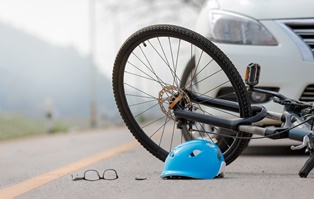
Protecting Your Rights After a Northern Virginia Bicycle Crash
Virginia is an at-fault insurance state. Under the Commonwealth’s tort-based insurance system, accident victims have a legal right to file a claim for compensation against the person or party who caused their bicycle accident.
However, insurance companies are fundamentally for-profit enterprises. Even if you have a seemingly open-and-close case, the adjuster could undermine your claim by asking for never-ending documentation, hoping you will eventually give up and accept a bad-faith settlement.
After a bicycle accident, there are steps to take that will help protect your right to a legal recovery.
Call 911
Virginia law requires that the operator of any motor vehicle contact law enforcement if they are involved in an accident resulting in:
- Significant property damage
- Personal injury
- Death
Bicyclists are not necessarily obliged to report an accident if they do not believe they have been injured. However, contacting law enforcement could prove beneficial if you need to file a personal injury claim. Even if the investigating officer is unable to establish fault, their report could be used as evidence in insurance negotiations.
Seek Immediate Medical Attention
You should always see a doctor after an accident. Since bicycle crashes are inherently traumatic events, some victims may overlook injuries while suffering from shock or reeling from an unexpected rush of adrenaline. A physician could help you identify, diagnose, and treat injuries that are not immediately obvious.
Additionally, seeing a doctor will show the insurance company that you have legitimate concerns about your physical health—not simply looking to profit from a tragic accident.
Collect Evidence
If you do not need emergency care, try to collect evidence from the crash site. Evidence could include the following:
- Photographs of your visible injuries, including bruises, lacerations, or road rash
- Pictures of the damage to your bicycle or to the other vehicle
- A recorded or written recollection of how the accident occurred
If you did not have enough time to collect evidence from the accident site, an experienced Northern Virginia bicycle crash lawyer could help you collect, analyze, and preserve any evidence needed to support your claim.
Speak to Eyewitnesses
Eyewitness testimony can make or break a personal injury claim. If another person witnessed your Virginia bicycle crash, ask them for their full name, their phone number, and other contact information.
Contact an Attorney
An experienced Virginia bicycle accident attorney could help you construct a compelling and evidence-based claim for compensation. Virginia, unlike some states, does not currently cap or otherwise limit the damages available in a personal injury lawsuit.
Kearney, Freeman, Fogarty & Joshi, PLLC could help you obtain damages, including:
- Past, present, and anticipated medical expenses
- Physical rehabilitation
- Lost income from work
- Diminished earning potential
- Emotional pain and suffering
- Loss of enjoyment
- Disfigurement
- Disability
- Wrongful death
While Virginia does not currently cap damages, the Old Dominion does have a strict statute of limitations. If you wait too long to contact a bicycle crash lawyer, the statute of limitations could lapse, forcing the court to dismiss your claim on a technicality.
Skilled Legal Help for Your Personal Injury
Our experienced Fairfax accident injury attorneys understand that when you’re hit by a car, it may put you out of work; you may face expensive medical bills; and you may be overwhelmed and confused by the legal challenges of filing a personal injury claim. We know that you need skilled, experienced lawyers who can provide you with immediate help.
At Kearney, Freeman, Fogarty & Joshi, PLLC, we offer a free, no-obligation consultation to discuss your case, and all of our personal injury work is handled on a contingent fee basis. That means, you face no legal fees if we don’t recover for you. Let the personal injury attorneys at Kearney, Freeman, Fogarty & Joshi, PLLC help you obtain the justice you deserve, especially if you suffer catastrophic injuries or must deal with the wrongful death of a loved one. Contact us online, or call us at 703-691-8333.
Virginia has thousands of miles of shoreline. Each year, visitors from across the region travel to enjoy the Old Dominion’s Atlantic coast, fast-moving rivers, and picturesque lakes. While taking a boat down the Potomac or Roanoke River can be fun for the whole family, the number of boaters can make Virginia waterways dangerous. When boaters make mistakes, whether by underestimating inclement weather conditions or drinking behind the wheel, the consequences can be catastrophic.
If you or a loved one suffered injuries in a Virginia boating accident that was not your fault, you could be entitled to significant compensation. However, your chances of recovery could be contingent on the quality of your legal representation. Without the right attorney, securing a fair recovery may be a significant challenge. 
When You May Need a Virginia Boat Crash Attorney
Not every boating accident results in serious injuries or property damage. While you might not need an attorney to recover from a fall overboard or running aground on a sandbar, more serious accidents demand a more serious response.
If You Suffer Serious Injuries
- Cuts or lacerations
- Broken or fractured bones
- Traumatic head injuries
- Burns
- Amputation
- Drowning
Even with a comprehensive health insurance policy, paying medical expenses after a serious Virginia boat accident could be difficult. You might be asked to pay out of pocket for co-pays or percentage-based deductibles. A lawyer can help you assess your damages and determine whether your claim could be eligible for compensation.
If the Accident Was Caused by Negligence
Every Virginia boater has a duty of care to operate their watercraft in a reasonable manner. If a boater fails to uphold their duty of care and negligently causes an accident, they could be held liable for the costs of the resulting damages. However, establishing negligence can be difficult and requires proving four elements.
Establishing Negligence
- The boat operator owed you a legal duty of care.
- The boat operator negligently breached their duty of care.
- The boat operator’s negligence directly caused or contributed to your accident-related injuries.
- Your damages, such as medical expenses, lost income, and property damage, can be compensated.
Your ability to establish negligence often requires that you provide high-quality evidence. Even if you were unable to collect evidence from the crash site, an attorney could help you thoroughly investigate the causes and circumstances of your Virginia boat crash.
If the Boat Owner Is Underinsured
Virginia, unlike some other states, does not require that private pleasure watercraft carry valid insurance policies. While many boaters do purchase liability coverage, securing compensation from a private party or insurance company can be very difficult. The defense attorney could employ common strategies to contest your claims, telling the court that your own negligence caused or contributed to the accident.
If the Insurance Adjuster Refuses to Negotiate
Even if the negligent boater or boat rental company had a liability insurance policy, insurance adjusters do not always negotiate in good faith. The adjuster could try to undermine your claim by:
- Asking you to consent to “independent” medical examinations—with a physician the insurance company chooses, who may have a reputation for rejecting claims
- Burying you in paperwork, asking you to provide seemingly never-ending proof of injury
- Requesting that you provide a recorded statement, perhaps even pressuring you to speak to an adjuster without an attorney present
While insurance companies employ a variety of strategies designed to undermine strong liability claims, an experienced Virginia boat accident attorney will know what to expect and how to help you overcome the insurance company’s defense.
Get Skilled Legal Help After Your Virginia Boat Accident
The physical and financial consequences of a serious Virginia boat accident can be life-changing. Our experienced Fairfax accident injury attorneys understand that when you’re injured, it may put you out of work; you may face expensive medical bills; and you may be overwhelmed and confused by the legal challenges of filing a personal injury claim. We know that you need skilled, experienced lawyers who can provide you with immediate help.
At Kearney, Freeman, Fogarty & Joshi, PLLC, we offer a free, no-obligation consultation to discuss your case, and all of our personal injury work is handled on a contingent fee basis. That means, you face no legal fees if we don’t recover for you. Let the personal injury attorneys at Kearney, Freeman, Fogarty & Joshi, PLLC help you obtain the justice you deserve, especially if you suffer catastrophic injuries or must deal with the wrongful death of a loved one. Contact us online, or call us at 703-691-8333.
Rear-end collisions are believed to constitute one-third of all motor vehicle accidents. While these crashes have a variety of causes, they all have the potential to inflict devastating and life-threatening injuries. 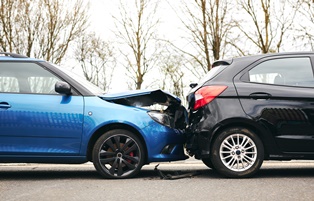
Rear-End Crashes: a Preventable Accident
Rear-end collisions are often referred to as minor accidents or “fender benders.” However, according to the National Transportation Safety Board (NTSB), they result in approximately 500,000 injuries and 1,700 deaths each year. Rear-end crashes are very often the result of “preventable negligence,” and the at-fault driver is usually the one in the rear. Although rear-end car crashes usually occur in slow-moving city traffic, they can happen anywhere and at any time.
Causes of Rear-End Collisions
- A reckless motorist. When motorists speed, display road rage, or otherwise violate the rules of the road, they put themselves and all other drivers at risk. Since higher rates of travel correlate with long braking distances, drivers exceeding posted speed limits may not be able to brake in time to avoid an unexpected obstacle.
- A distracted driver. Researchers have found that distracted driving is as unsafe as drunk driving. When people take their attention away from the road, whether to change radio stations or send a text message, they may fail to notice traffic issues ahead.
- An intoxicated operator. While drunk driving deaths are on the decline, driving under the influence remains one of the leading causes of preventable injury and death in the United States. Under most circumstances, an intoxicated motorist could be held liable for the costs of any resulting accident and injuries.
- A tired driver. Fatigued driving has been termed a silent epidemic. Studies have shown that fatigue is involved in up to 20% of all motor vehicle accidents.
- A mechanical failure. Mechanical failures, which could include faulty brakes, bald tires, or defective suspension systems, may impair a motorist’s ability to avert an accident. While many mechanical failures are the result of poor maintenance, others could be caused by manufacturer error and oversights.
Establishing Liability After a Rear-End Collision
Virginia law affords accident victims the right to file a claim for compensation against an at-fault motorist. However, securing a fair settlement after a rear-end collision could prove difficult—especially if the other driver, or their insurance company, tries to convince the court that your own negligence caused or contributed to the accident.
Since insurance companies are fundamentally for-profit enterprises, they will often seize any opportunity to reduce their financial liability. In many cases, they will use whatever means necessary to deny or delay compensation.
How Your Car Accident Attorney Can Help Prove Liability
- Analyzing physical evidence from the crash site, including photographs of the damage to both vehicles as well as pictures of your physical injuries
- Subpoenaing surveillance camera footage from nearby businesses and traffic safety systems
- Inspecting the at-fault motorist’s text message history, phone records, and recent financial transactions
- Interviewing potential eyewitnesses whose testimony could prove critical in insurance negotiations or in a jury trial
Depending on the circumstances of your Virginia rear-end collision, you could be entitled to file a claim against:
- The at-fault motorist
- The at-fault motorist’s insurance company
- A negligent business such as a semi-truck company or maintenance contractor
- A government agency
- A vehicle maker or automotive parts manufacturer
Your Potential Damages After a Virginia Car Crash
The Law Firm of Kearney, Freeman, Fogarty & Joshi, PLLC is committed to defending the rights of Virginia automobile accident victims. We have successfully litigated high-profile collision cases, including:
- Securing an $80,000 jury verdict for a motorist injured in a rear-end car crash
- Obtaining $200,000 for a Virginia driver who developed degenerate disc disease after being injured in a collision
- Winning a $475,000 settlement after a semi-truck driver struck another vehicle from behind
Since Virginia law does not cap the compensation an accident victim can receive from a rear-end collision personal injury lawsuit, you could receive as much money as you need to begin the difficult task of reclaiming your independence and rebuilding your life.
However, you have to act fast. If you wait too long to take action, Virginia’s strict statute of limitations could preclude you from filing a claim. If the statute of limitations lapses, the court could automatically dismiss your lawsuit without further consideration.
Contact Us Today
A rear-end collision could have life-changing consequences. At Kearney, Freeman, Fogarty & Joshi, PLLC, we advocate for our clients and know what it takes to overcome a vigorous defense. Please send us a message online, or call us at 877-652-1553 to schedule your free, no-obligation consultation as soon as possible.
|
Related links: |
According to the Centers for Disease Control and Prevention (CDC), vehicle accidents are the number one cause of death for those aged 1 – 54. Over half of those deaths are due to vehicle occupants not wearing seat belts. These life-saving devices are sometimes ignored because passengers say they’re uncomfortable, and passengers also say that when traveling short distances, they simply forget to put them on. If you forget to buckle up or choose not to wear a seat belt, and you’re injured in an accident that wasn’t your fault, it may be more difficult to receive compensation. 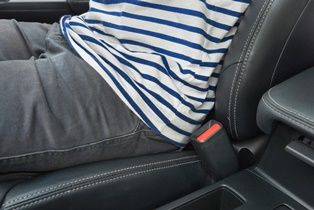
Virginia’s Seat Belt Laws for Adults and Children
Almost every state in the country requires that motorists wear seat belts whenever they are operating or sitting inside a moving vehicle. Virginia has its own strict seat belt laws, which require the following:
- Drivers and passengers age 16 or older must wear a seat belt if they are sitting in the front seat of a moving vehicle.
- Children under the age of 16 must wear a seat belt or be secured in a safety seat, irrespective of where they are sitting inside the vehicle.
There are some exceptions to these laws; however, most adults must buckle up when they occupy the front seat of a moving vehicle.
Contributory Negligence Laws in the Old Dominion
Virginia is one of very few states that adheres to a strict contributory negligence doctrine. Under most circumstances, whenever a motorist’s own misconduct contributes in any way to an accident or causes their car crash-related injuries, they cannot recover any damages from a personal injury lawsuit.
However, it’s important to remember that not wearing a seat belt does not constitute negligence.
The accident victim didn’t cause the crash because they chose not to wear a seat belt. However, the insurance company will want to prove that you contributed to your own injuries because you chose not to wear one.
Contributory Negligence and Recovering Damages
Defense attorneys will sometimes allege that an accident victim’s failure to wear a seat belt contributed to or caused their car crash-related injuries. Many studies, surveys, and academic analyses have shown that seat belt usage reduces the risk of sustaining serious and potentially life-threatening physical injuries.
However, state law explicitly prohibits these arguments in personal injury lawsuits. For example, Virginia Code § 46.2-1094 states that a violation of Virginia’s seat belt laws does not necessarily bar claimants from filing or pursuing a civil claim against an at-fault motorist.
Under most circumstances, a defense attorney cannot even admit an accident victim’s failure to wear a seat belt into evidence, unless the victim’s seat belt usage relates to another, more significant act of misconduct such as driving under the influence of alcohol or instigating a road rage incident.
Building a Compelling Personal Injury Case
While Virginia law may not bar accident victims from recovering damages if they failed to use their seat belts, securing a fair and equitable settlement could still be challenging. Since insurance companies are fundamentally for-profit enterprises, they will often seize any opportunity to deny or devalue a claimant’s compensation.
How an Experienced Virginia Car Crash Attorney Can Help
- Collecting and analyzing police reports
- Gathering evidence from the crash site
- Interviewing bystanders and potential eyewitnesses
- Reviewing your medical records to assess the totality of your recoverable damages
- Negotiating with the insurance company on your behalf, letting you focus on your physical recovery
Potential Damages After a Virginia Car Accident
- Your past, present, and anticipated medical expenses
- Physical rehabilitation
- Therapy
- Lost income from work
- Exhausted vacation days and paid time off (PTO)
- Diminished earning potential
- Emotional pain and suffering
- Loss of enjoyment
- Disability
- Disfigurement
- Wrongful death
Virginia does not currently cap the damages available to car accident victims. However, it does have a strict statute of limitations. If you wait too long to file a claim, a Virginia court could dismiss your case without further consideration, leaving you responsible for the costs of an accident that was not your fault.
Contact a Virginia Attorney Today
Kearney, Freeman, Fogarty & Joshi, PLLC has spent years advocating for the rights of Virginia automobile accident victims. Our firm believes that nobody should be forced to pay for another motorist’s mistake. Please send us a message online, or call us at 877-652-1553 to speak to a legal professional, and schedule your 100% free, no-obligation consultation as soon as possible.
|
Related Links: |
Few parents think twice about sending their child to school on a community or district bus. While accidents do happen, they don’t occur often. In fact, some reports suggest that children are safer in school buses than they are in their parents’ cars.
However, the statistical safety of school buses does not mean that accidents never happen. Each year, thousands of Virginia parents learn that their children’s health and safety have been put at risk by a negligent school bus driver or a reckless motorist. 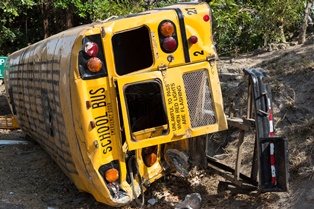
What to Do After a Virginia School Bus Accident
If your child has been injured in a school bus accident, there are certain steps to take to help ensure they have the best chance for recovery and to hold the at-fault driver responsible.
Call 911
The school bus driver is likely required to report any accident to the district, but that does not mean law enforcement will respond to the scene—especially if the driver does not believe any passengers have been injured.
However, if your child has been involved in an accident and is still at the scene of the crash, you should call 911 to report the collision immediately. While the police might not be able to determine fault without an intensive investigation, they can help arrange emergency medical transportation.
Additionally, the responding officer’s after-accident report could be used as critical evidence in a personal injury lawsuit or insurance claim.
Seek Immediate Medical Attention
You should always take your child to the doctor after an accident, even if you don’t believe they’ve been seriously injured. Since young children often lack the words and experience needed to explain their injury-related symptoms, they may not be able to effectively communicate that they are in pain.
Seeing a doctor serves several purposes:
- An experienced physician can identify, diagnose, and treat injuries that your child had not recognized they sustained.
- The doctor can recommend follow-up care or effective home remedies to help your child recover as quickly as possible.
- Seeking medical care shows the insurance company that you had serious concerns about your child’s health and are not seeking to profit from an unfortunate accident.
Collect Evidence From the Accident Site
If you are in a position to reach the accident site and have ensured your child’s safety, consider collecting the following evidence to bolster any personal injury claim you might eventually file:
- Photographs of vehicular damage. If you can approach the crash site safely, try to take photographs of the damage to the school bus and any other vehicles involved in the accident.
- Pictures of your child’s injuries. Take pictures of your child’s visible wounds, such as bruises, lacerations, or any other noticeable injuries.
- Eyewitness testimony. Eyewitness testimony can make or break a personal injury claim. If you believe that a bystander or another motorist may have witnessed the collision, ask them for their name, phone number, and other contact information.
Depending on the circumstances of your child’s accident, you may not be able to reach the crash site before the vehicles have been moved. If you cannot collect evidence, you should consider asking your child to document the crash to the best of their ability.
In many cases, your personal injury attorney could also dispatch an investigative team to the scene, ensuring that all available evidence remains intact and documented.
Take Fast, Decisive Action
Virginia law affords school bus accident victims the right to file a personal injury lawsuit if they have been injured in a crash that was not their fault. But your rights to a legal recovery could be compromised if you take too long to take action. The Old Dominion has a strict statute of limitations, and in most cases, accident victims have two years after the date of the incident to file a claim for compensation.
However, the statute of limitations for claims involving government entities is much shorter, ranging between six months and one year. If you wait too long to take action, your case could be dismissed by the court on a technicality.
Contact an Experienced School Bus Accident Attorney
Numerous studies have shown that families who hire experienced legal counsel are much more likely to secure a favorable settlement or receive damages in court than families who represent themselves.
However, hiring a lawyer has other benefits. An experienced Virginia school bus accident attorney can help you:
- Investigate the causes of your child’s school bus crash
- Negotiate with the insurance company
- Communicate with adjusters on your behalf
- Evaluate your family’s maximum legal damages
- Collect, compile, and analyze the evidence needed to win your case in court
Schedule Your Consultation Today
Your family should not have to pay the price for a school bus driver’s negligence or another motorist’s recklessness. Please send Kearney, Freeman, Fogarty & Joshi, PLLC a message online, or call us at 877-652-1553 to schedule your free, no-obligation consultation as soon as possible.
|
Related links: |
Vehicle accidents are common; however, some collisions are more likely to end in serious injury than others. Semi-truck crashes are often especially devastating, leaving victims disfigured, disabled, and sometimes deceased. 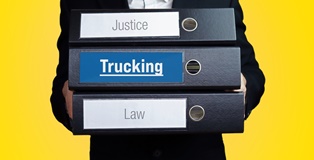
Why Hire a Virginia Semi-Truck Attorney
Semi-truck accidents are different than other types of collisions. Not only are these crashes more likely to inflict serious, disabling injuries, they are also comparatively complex. Since the interstate transportation industry is regulated at the state and federal levels, trucking companies are held to a variety of rules and regulations. While these rules and regulations often work to the benefit of victims, they can be difficult to navigate without special legal training.
An experienced semi-truck accident attorney can help you bolster your chances of receiving a favorable settlement in many ways.
Investigating the Accident
Your semi-truck accident attorney can help you investigate the causes and circumstances of your accident by:
- Collecting evidence from the crash site
- Interviewing eyewitnesses
- Inspecting the damage to your vehicle and the damage to the semi-truck
- Examining the at-fault truck driver’s employment history, qualifications, and drug test results
- Reviewing the trucking company’s safety and violations records
Determining Liability
In ordinary automobile accident claims, there is usually only one defendant: the at-fault driver.
However, semi-truck injury lawsuits typically investigate the potential wrongdoing of multiple parties. For example, the employing company could have contributed to the accident by pressuring the driver to remain on the road when they were tired. Consequently, your case could include several defendants, including:
- The semi-truck driver
- The trucking company
- A cargo shipper
- A vehicle manufacturer
- A vehicle parts maker
Your attorney will review the available evidence to identify potential defendants, doing everything in their power to ensure you receive a fair settlement.
Negotiating a Settlement
Semi-truck companies are required by law to purchase and maintain large liability insurance policies. However, insurance companies are still for-profit enterprises that are typically more interested in increasing their profits than paying fair settlements.
Even if you have been seriously injured, the adjuster might try to devalue or deny your claim by:
- Asking you to provide a recorded statement, which they could scour for contradictions, hoping to use your own words against you
- Demanding that you consent to a so-called “independent medical examination,” which might be scheduled with a physician with a reputation for denying injury claims
- Refusing to negotiate in good faith
Insurance adjusters will often recommend that accident victims avoid hiring an attorney because they know that victims without representation are more likely to accept a lowball settlement.
Maximizing Your Compensation
Virginia does not currently cap the damages available to semi-truck accident victims. However, assessing the totality of your damages could be difficult, especially if you require continuing medical care or long-term assistance.
Your semi-truck accident attorney could help you claim damages for:
- Your past, present, and anticipated future medical expenses
- Physical rehabilitation
- Prescription medication co-pays
- Lost income
- Diminished earning potential
- Disfigurement
- Disability
- Wrongful death
While Virginia does not cap damages, it does have a strict statute of limitations. Under Virginia’s statute of limitations, accident victims have a limited timeframe to file a personal injury lawsuit. If you wait too long to take action, the court could dismiss your claim without giving you a chance to tell your side of the story.
Contact an Attorney Today
Kearney, Freeman, Fogarty & Joshi believe that nobody should have to pay the price for a trucking company’s poor policies. If you or a loved one suffered injuries in a Virginia semi-truck accident that was not your fault, you could be entitled to significant compensation. Please send us a message online, or call us at 877-652-1553 to schedule your free, no-obligation consultation as soon as possible.
|
Related links: |
The aftermath of a serious automobile accident can challenge even the most robust insurance policies. If you’re injured in a crash, Virginia law affords car crash victims the right to file legal claims for damages, but hiring a competent, experienced attorney might seem like a financial impossibility.
However, Kearney, Freeman, Fogarty & Joshi, PLLC works on a contingency fee basis. We understand that money might be tight, so when we accept a new case, we never ask our clients to pay for representation upfront. Instead, we only accept payment as a percentage of your eventual settlement. If we cannot secure compensation, you will not owe us anything. 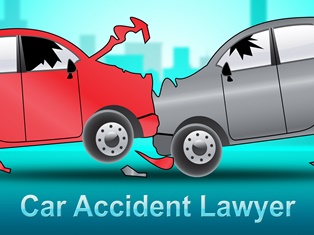
Contingency Fees Make Legal Representation Affordable
People often make the mistake of thinking that experienced legal counsel is a luxury only the wealthiest Virginians can afford. While this stereotype might be unfair, it has some basis in reality: many attorneys do charge sky-high fees, asking for premium payment in return for premium representation.
However, the practice of charging exorbitant fees is not universal—nor is it always standard. Most personal injury law firms work on a contingency fee basis. They will only charge clients after winning their case, taking a percentage of the eventual insurance settlement or court-ordered award. This charge is called a “contingency fee” because it is contingent upon a successful resolution. If they don’t win your case, they do not get paid.
Because personal injury attorneys work almost exclusively with people who have suffered serious, accident-related injuries, they understand that victims have to re-direct their income and savings to potentially life-saving treatment, and it would not be fair to ask that they risk their recovery for representation.
Kearney, Freeman, Fogarty & Joshi, PLLC has spent decades aggressively advocating for the rights of Virginia car accident victims. Since our clients are often in pain, facing financial ruin, and struggling to reclaim their independence, we do not expect our clients to be able to pay for our services until their case is resolved.
How a Virginia Car Crash Lawyer Helps Secure a Fair Settlement
You do not need a lawyer to file a claim for compensation after being involved in a Virginia car crash that was not your fault. However, working with an experienced personal injury attorney has many benefits. Since automobile insurance companies are for-profit enterprises, they will often do everything in their power to devalue or deny claims. They might:
- Accuse you of exaggerating or faking your injuries
- Ask you to consent to an “independent” medical examination, hoping to blame your accident-related injuries on a pre-existing condition
- Ask you to provide a recorded statement, later using your own words against you
- Refuse to negotiate in good faith, demanding never-ending “evidence” to support your claim
How Kearney, Freeman, Fogarty & Joshi, PLLC Can Fight Underhanded Insurance Strategies
- We can investigate the causes and circumstances of the accident
- We can interview eyewitnesses
- We can subpoena traffic camera footage and surveillance recordings
- We can communicate with the insurance company on our clients’ behalf
Our attorneys take on the hard work of claim negotiations, letting our clients focus their energy on regaining their physical health and mental well-being.
A Virginia Lawyer Can Help You Obtain Potential Damages
- Your past, present, and future medical expenses
- Physical rehabilitation
- Prescription medication co-pays
- Reconstructive surgery
- Lost income from work
- Diminished earning potential
- Emotional pain and suffering
- Disability
- Disfigurement
- Wrongful death
Virginia does not currently cap the damages that car accident victims could receive after filing a personal injury lawsuit. However, you need to act fast. While Virginia might not cap damages, it does have a strict statute of limitations. If you wait too long to take action, the court could automatically dismiss your claim, and you won’t be able to obtain compensation.
Contact a Virginia Attorney Today
If you were injured in a Virginia automobile accident that was not your fault, you could be entitled to significant damages through an insurance claim or personal injury lawsuit. Please send Kearney, Freeman, Fogarty & Joshi, PLLC a message online, or call us at 877-652-1553 to schedule your free, no-obligation consultation.
|
Related links: |
The loss of a loved one can be emotionally devastating. While no amount of money is sufficient compensation for losing someone you care about, a wrongful death lawsuit provides an opportunity to hold a wrongdoer accountable for their misconduct. However, wrongful death claims are not always straightforward. Depending on the circumstances of your loved one’s motor vehicle accident, you may have to take action against multiple defendants. 
Wrongful Death Claims in Virginia
If your loved one died due to another person’s negligence, you and your family could be entitled to significant compensation through a wrongful death lawsuit. While many people are reluctant to file wrongful death claims because they do not wish to profit from the loss of a loved one, wrongful death lawsuits are about much more than money.
Benefits of a Successful Claim
- Provide your family with the money needed to pay for your loved one’s funeral costs and burial expenses
- Hold a wrongdoer accountable in civil court
- Prevent other members of your community from suffering a similar loss
Although there are benefits to filing a wrongful death claim, these claims can be complex. Even if you have a seemingly open-and-shut case.
What You Must Prove in a Virginia Wrongful Death Case
- The person who caused the accident owed your loved one a “legal duty of care,” meaning they had an obligation to protect the safety of your loved one.
- The person who caused the accident violated their legal duty of care by acting negligently.
- The breach of the defendant’s duty of care caused your loved one’s accident.
- You and your family have suffered a significant loss that could be alleviated through the award of damages.
Identifying the Right Defendants in a Virginia Wrongful Death Claim
Since the plaintiffs in a Virginia wrongful death lawsuit have to prove beyond reasonable doubt that another party’s wrongdoing caused their loss, identifying and pursuing the right defendants is critical to a successful case.
Possible Defendants in a VA Motor Vehicle Wrongful Death Claim
- The negligent driver
- The employer of the negligent driver, if they were on the clock and driving a vehicle for work-related purposes at the time of the accident
- The owner of the vehicle, if the vehicle was owned by a third party
- An automobile repair shop, if a faulty repair caused or contributed to the accident
- An automotive parts maker, if a defective part caused or contributed to the accident
- An automobile manufacturer, if a manufacturing defect caused or contributed to the accident
- A government entity, such as the Virginia Department of Transportation or a municipal infrastructure body, if the accident was caused or exacerbated by a dangerous road condition
Filing claims against more than one wrongdoer could increase a family’s chances to recover damages. However, plaintiffs must ensure they have sufficient evidence to file a claim against multiple parties.
If you name too many defendants—and cannot prove their liability—the court may be skeptical of your intent. In a worst-case scenario, the defendants could allege that you are seeking to monetize your loved one’s tragic Virginia car accident, causing the judge to dismiss your case before you ever get the chance to tell your story.
Speak to a Virginia Wrongful Death Attorney Today
Kearney, Freeman, Fogarty & Joshi, PLLC have served clients across Fairfax and Northern Virginia for more than three decades. Our experienced attorneys know how to construct a compelling, evidence-based case to persuade an insurance company, a judge, or a jury that a wrongdoer should be held accountable for your loved one’s wrongful death.
However, you shouldn’t wait to take action. While Virginia does allow wrongful death plaintiffs to recover damages on behalf of a deceased family member, the state also has a strict statute of limitations. If the statute of limitations lapses, the court could automatically dismiss your claim on a technicality.
Do not lose your chance to get justice for your loved one. Please send Kearney, Freeman, Fogarty & Joshi, PLLC a message online, or call us at 877-652-1553 to schedule your free, no-obligation consultation.
|
Related links: |
Fairfax County, along with the rest of the Washington, D.C. Metropolitan Area, is among the most walkable regions in the entire United States. However, in spite of local governments’ heavy investment in a pedestrian- and bicycle-friendly infrastructure, enjoying the outdoors is not without risks. Accidents can and do happen with alarming regularity.
In any collision between an automobile and an individual, the motor vehicle usually avoids damage and the driver avoids injury, while the walker, cyclist, or jogger sustains serious and even life-threatening injuries. Although local traffic safety advocates have aggressively campaigned for better-marked crosswalks and bicycle lanes, Fairfax County still has a number of dangerous roads and routes.
The Most Dangerous Roads in Fairfax County
Virginia tries to protect pedestrians and bicyclists by affording them the right of way over motor vehicles in all crosswalks and intersections, as well as granting bicyclists the same rights as automobiles on public roadways. However, even stringent laws cannot prevent every accident. Fairfax County has several areas that witness unusually high incidences of automobile collisions, pedestrian accidents, and bicycle crashes. While many accidents are caused by reckless motorists, sometimes a combination of poor driving, heavy traffic, and flawed road design can increase the risk of collisions, and there are many dangerous roads in Fairfax County, including:
- Route 7, especially between Baileys Crossroad and Seven Corners. This high-traffic commercial area adjoins several closed-access motorways but lacks numerous crosswalks and bicycle lanes.
- Route 1, between Alexandria and Dumfries. Similar to Route 7, this road passes through a number of high-traffic commercial areas.
- Route 29, between Centreville and Fairfax.
- Route 50, a heavily trafficked route that passes through commercial areas as well as densely settled residential neighborhoods.
- Backlick Road, a major multi-lane road plagued by fast-moving traffic and hazardous intersections.
- Telegraph Road, which receives heavy commuter and city bus traffic, despite passing through predominately suburban and semi-rural areas.
- Shreve Road at the Washington and Old Dominion Trail, a particularly hazardous blind turn across a popular suburban hiking trail and bicycle path.
- Old Keene Mill Road and Franconia Road, between Franconia and North Springfield.
- The Columbia Turnpike, especially the eastbound portion near the Virginia-Washington, D.C. border.
What to Do After a Virginia Pedestrian or Bicycle Accident
If you were injured in a Fairfax County pedestrian or bicycle accident that was not your fault, you could be entitled to significant compensation through an insurance claim or personal injury lawsuit. However, proving that a motorist was at-fault could be difficult.
Building Your VA Legal Case if You Were Struck by a Vehicle
- Seek immediate medical attention. You should always visit a physician after a pedestrian or bicycle accident, even if you do not believe you sustained severe injuries. Some common, seemingly minor injuries, such as road rash, could become more serious if not properly treated. Additionally, seeing a doctor shows the insurance company that you have serious concerns about your physical well-being and are not simply trying to make money from a settlement.
- Call the police. While calling 911 after an accident might seem inconvenient, a police report can assist your attorney and the insurance adjuster in determining whether the motorist should be held liable for your injuries. Even if law enforcement cannot determine who or what caused the accident, their report could still be used as evidence in negotiations or at trial.
- Collect evidence. If you do not need emergency medical treatment, you could collect evidence from the accident site. You could take pictures of your visible injuries, your damaged bicycle, and any nearby crosswalks and traffic control signals.
- Speak to eyewitnesses. If another person witnessed your accident, ask them for their name, phone number, and other contact information. Their testimony could help you at trial.
- Contact an attorney. You stand your best chance at making a full legal recovery when you have an experienced attorney on your side. Kearney, Freeman, Fogarty & Joshi, PLLC have years of experience fighting for the rights of pedestrian and bicycle accident victims in court. We can help you construct a compelling, evidence-based claim to help you get the compensation you need and the justice you deserve.
Contact Our Virginia Car Accident Attorney Today!
If you have been injured in a Fairfax County pedestrian or bicycle accident, send Kearney, Freeman, Fogarty & Joshi, PLLC a message online today, or call us at 877-652-1553 to schedule your free, no-obligation consultation.
|
Related links: |
Coming to terms with the loss of a loved one can be incredibly difficult, especially if their life was taken by another person’s negligence. You may feel heartbroken while still being expected to meet unforeseen responsibilities and expenses. Instead of focusing on your family, you might be forced to deal with funeral fees and burial costs.
While no amount of money can compensate for the loss of a relative, a wrongful death claim could help ease your family’s financial burden. 
Deciding If a Wrongful Death Lawsuit Is Right for You
If you have recently lost a loved one due to the negligence of someone else, you may be reluctant to file a wrongful death lawsuit, even if you are in desperate need of financial relief. However, a wrongful death lawsuit is about much more than money.
Reasons to File a Wrongful Death Claim
- Hold a wrongdoer accountable for this misconduct. Wrongful death cases do not always lead to criminal convictions. By filing a lawsuit, you could hold a negligent individual, business, or other entity accountable in civil court, establishing that their misconduct caused an unimaginable tragedy.
- Prevent similar tragedies. A wrongful death settlement might help make your community a better, safer place. Your attorney could help you negotiate a policy-oriented agreement, asking that a business, police department, or city change its operating procedures to prevent further deaths.
- Ease your family’s financial suffering. People often hesitate to file wrongful death lawsuits because they fear any legal action will be interpreted as a crass money-grab. However, you should not have to pay for a funeral, a casket, and other burial-related costs because of someone else’s negligence.
The Benefits of Working With a Virginia Wrongful Death Attorney
Virginia law strives to provide everyone with equal access to its civil courts. You do not need a lawyer to initiate an insurance claim, file a wrongful death lawsuit, or appeal a judgment.
However, representing yourself has many risks. You might already be overwhelmed with grief and unable to give your case the attention it deserves. Even if you believe you have the time and energy to pursue a claim, you could be stonewalled by an uncooperative insurance company more intent on preserving its profit margins than compensating for a client’s misconduct.
How an Attorney Can Help
- By protecting your family’s rights. Wrongful death cases can be very complex, with insurance negotiations and award judgments all subject to local, state, and federal laws. If you are not intimately acquainted with Virginia’s legal expectations for claims, your case could be dismissed on a technicality, preventing you from pursuing justice for your loved one.
- By speaking to insurers. If you file a wrongful death claim, you may be forced to contend with a business or city’s insurer. Insurance companies aren’t interested in making things right and want to save their shareholders money. Instead of negotiating with you, an insurer might simply make you a low-ball offer, hoping you’ll accept it quickly. A Virginia wrongful death attorney could protect your family’s rights by standing up to the insurance company and forcing them to take your claim seriously.
- By assessing your damages. You may be entitled to damages beyond funeral fees and burial expenses, including lost income, loss of companionship, and emotional pain and suffering. Kearney, Freeman, Fogarty & Joshi regularly work with experts who could help investigate the circumstances of your loved one’s death and assess the broader value of your claim.
- By giving you peace of mind. Hiring a Virginia wrongful death lawyer spares you the emotional and financial burden of speaking to insurance adjusters, responding to paperwork requests, and going to court.
Contact Us Today
If you want to file a Virginia wrongful death lawsuit, Kearney, Freeman, Fogarty & Joshi, PLLC could help you and your family get the compensation you need and the justice you deserve. Please send us a message online, or call us at 877-652-1553 to schedule your free, no-obligation consultation as soon as possible.
|
Related links: |
The loss of a loved one is always traumatic, especially if they died due to another person’s negligence. While you’re dealing with overwhelming grief, your family might be left with expensive medical bills and funeral costs. Under normal circumstances, you might expect the at-fault driver’s car insurance company to reimburse your financial losses. However, securing a fair settlement can be challenging even if you believe you have an open-and-shut case. 
How Adjusters Try to Devalue and Deny Claims
If you lost a loved one in a Virginia car accident, the insurance adjuster might have a lot of genuine sympathy for your situation. But while they may feel sorry that their client’s wrongdoing cost an innocent life, their loyalty is to the insurance company—not you or your family. Insurance companies are most concerned about their bottom line, and they do not turn a profit if they pay every deserving family a fair settlement.
Insurance adjusters are not just investigators—they are trained negotiators who will do everything in their power to devalue or deny your claim, even when you are clearly entitled to compensation.
How Adjusters Try to Deny Claims
- Asking you trick questions when your mind and emotions are clouded by grief
- Asking you to make a recorded statement they will use against you
- Requesting your loved one’s medical history, so they can attribute incurred medical expenses to a pre-existing condition
Since speaking to an insurance adjuster is always risky, you should never agree to provide a recorded statement or sign a medical release form without first speaking to a qualified Virginia wrongful death attorney.
Never Rush to Accept a ‘Fair’ Settlement
If you have a clear-cut case, an adjuster might tell you the insurance company has all the evidence it needs and is willing to offer you a settlement. However, you should never accept an adjuster’s offer without first speaking to a Virginia wrongful death attorney. The other driver’s insurer might pay you enough money to reimburse your loved one’s medical costs or funeral expenses, but they likely will not account for other expenses.
Expenses the Insurance Company Will Ignore
- Emotional pain and suffering
- Loss of enjoyment
- Loss of companionship
- Long-term therapy
- Other injuries associated with an accident
How a Virginia Attorney Can Help Your Family Get Justice
People are sometimes reluctant to negotiate better settlements after a wrongful death because they do not want to profit off the loss of a loved one. But a wrongful death claim is about much more than money.
Other Reasons to File a Wrongful Death Claim
- Hold the at-fault motorist accountable for their wrongdoing, regardless of whether they face criminal charges
- Convince a negligent business, such as a semi-truck company, to change their policies, ensuring that nobody else has to suffer a similar loss
- Receive reimbursement for money you never expected to spend on a funeral
- Attain a sense of closure after successfully concluding legal proceedings
If You Lose a Loved One, You Need Kearney, Freeman, Fogarty & Joshi
Kearney, Freeman, Fogarty & Joshi, PLLC believes that nobody should be forced to pay the price for another person’s negligence. Our highly skilled and experienced team of attorneys can help you get the compensation you need to recover after an unexpected and tragic loss. However, you need to act fast. While Virginia law does not cap the damages available in a wrongful death claim, it does have a strict statute of limitations that could prevent you from getting justice if you wait too long to take action. You stand your best chance at recovery by speaking to a lawyer as soon as possible.
You do not have to wait for the insurance company to offer you a fair deal after suffering the loss of a loved one. Send Kearney, Freeman, Fogarty & Joshi, PLLC a message online, or call us at 1-877-652-1553 to schedule your free, no-obligation consultation.
|
Related links: |
If another person’s negligence caused your loved one’s death, you could be entitled to financial compensation under Virginia state law. While many people are reluctant to file a wrongful death lawsuit, any compensation you obtain could be used to cover your relative’s funeral costs, burial expenses, and unpaid medical bills. However, Virginia has a strict statute of limitations for wrongful death claims. If you wait too long to file, your case could be automatically dismissed by a court, forcing your family to bear both the financial and emotional burden of someone else’s terrible mistake. 
The Virginia Statute of Limitations
A statute of limitations is a special law that restricts how long a person or entity can wait to take a specific legal action. Every state has these statutes, and Virginia has them for both civil and criminal cases, including wrongful death claims. In Virginia, the statute of limitations for wrongful death claims is usually two years from the date of death.
If you wait more than two years to file a wrongful death lawsuit, the court will likely dismiss your case. Even if a judge is willing to hear it, the negligent party’s attorney will point out that you filed past the statute of limitations, making you ineligible to recover damages.
Exceptions to Virginia’s Statute of Limitations
Virginia courts rarely grant exceptions to the statute of limitations in wrongful death claims. However, you may be able to obtain an extension under exceptional circumstances. A judge could waive or extend the statute of limitations if:
- A family did not discover the death for days, weeks, or months. If so, they will have two years from the date of discovery of death to file a claim.
- A surviving child was under 18 at the time of their parent’s death. Once the surviving child turns 18, they have an additional two years to file a wrongful death lawsuit, even if the statute of limitations has already passed.
If a case is highly unusual, a judge might allow for another type of exception. However, the vast majority of claims are subject to Virginia’s two-year statute of limitations.
Making Sure You Don’t Miss the Cutoff
Unless you have an exceptional case, you must file your wrongful death claim within the state’s two-year statute of limitations, and it’s important to file as soon as possible. Waiting too long could still jeopardize your claim. This is because:
- Critical evidence could get lost, go missing, or get destroyed.
- Law enforcement reports might get misplaced.
- Eyewitnesses’ memories may fade.
- A defendant could move out of state or re-title their assets to shield themselves from legal action.
Get the Right Help in Your Wrongful Death Claim
Proving wrongful death can be difficult, even when you have a seemingly open-and-shut claim. The court will still require that you demonstrate, with compelling evidence:
- That you have legal standing to file a wrongful death claim
- Why the at-fault party had a legal duty to protect your loved one
- How the at-fault party’s negligence cost your relative their life
- How the at-fault party’s negligence caused you to suffer or sustain significant financial, emotional, or physical damages that are recoverable in court
While you are collecting evidence to support your claim, you will also be responsible for meeting other court deadlines and filing rules. If the at-fault party has an attorney, they could bury you in paperwork requests or make the process unnecessarily complicated.
Contact Us
When you lose a loved to another person’s negligence, you deserve your best chance at recovery. Kearney, Freeman, Fogarty & Joshi, PLLC have years of experience fighting for the rights of our Virginia clients. We know what insurance companies, judges, and juries need to award damages for wrongful death. We have helped our clients recover millions of dollars in damages—money they and their families can use to pay off unforeseen costs and build back their lives. Please send us a message online to find out how we could help you.
|
Related links: |
The sudden, unexpected loss of a loved one is always devastating. While you struggle to overcome grief and adapt to life without a valued family member, you may be faced with expensive medical bills and funeral costs. If your loved one was a breadwinner, you may also be staring down a mortgage or childrearing costs you never thought you would have to face alone.
When you lose a loved one to another person’s negligence, you could be eligible to compensation through a wrongful death claim. However, you might not be sure you can afford the services of an experienced Virginia attorney. 
Affording a Wrongful Death Attorney
If you believe hiring a lawyer is too expensive, you are not alone. Many people who consider filing wrongful death lawsuits usually want an attorney but are afraid it’ll cost too much.
However, KFFJ Law operates on what’s called a “contingency basis.” When you work with our firm, we will never ask you to pay the costs of representation up front. While you might be asked to help with some incidental legal fees, we will not bill you for our services until you get a fair settlement.
Once you win your case, we take a percentage-based contingency fee from your settlement.
If we can’t get you the settlement you deserve, you pay us nothing.
Possible Damages in a Wrongful Death Claim
Filing a wrongful death claim can be a difficult decision. Many people worry that others will see a lawsuit as a way to make money from a loved one’s death. However, the costs of an unexpected death in the family can add up very quickly. Few people budget to lose a spouse, child, sibling, or parent to an accident. You might be responsible for expenses such as:
- Medical costs prior to your loved one’s death
- End-of-life care
- Funeral services
- Burial costs
Often, the costs of losing a loved one go far beyond the expenses of medical care and a funeral. If the deceased person was part of your household, the loss of their income could move you toward financial ruin. A wrongful death lawsuit can help secure damages to repay funeral and burial expenses and replace the deceased person’s income.
How an Attorney Can Help You Get Justice
Unlike some other states, Virginia does not cap damages in wrongful death lawsuits. However, recovering the money you need to begin reassembling your life can be very difficult without legal assistance.
If you lost a loved one in a car accident, for instance, you might think the at-fault motorist’s insurance will cover your losses. However, you may not be able to cover the totality of your damages through an insurance settlement. Even if the insurance carrier is willing to entertain your claim, they may be reluctant to provide fair compensation, hoping some combination of grief and financial stress will make you cave to a bad-faith offer.
A Virginia wrongful death attorney can help you stand up to an unfair insurance company, a reckless motorist, or a negligent business. We will investigate the circumstances of your loved one’s death, collecting the evidence needed to prove the other party’s fault. We will also conduct an overview of your financial losses—past, present, and future—to calculate a fair claim for damages.
If the insurance company, individual, or business is not willing to negotiate a fair settlement, we can and will take them to court.
Contact Us Today
When you work with KFFJ Law, we take your loss as our responsibility, and our hardworking staff of legal professionals will do everything in their power to ensure you get the financial recovery you need to begin putting your life back together.
You do not need to let money pose a barrier to justice. Send us a message online to schedule your free, no-obligation consultation today.
|
Related links: |
Any car accident can be costly, especially if your injuries require that you take time off work to recover. Depending on your employer’s policies, you may have had to use your sick days or vacation time to protect your position while your body was still healing—effectively robbing you of a later vacation and taking away free time you worked hard to earn.
If you were hurt in accident that was not your fault, you may be entitled to compensation for your damages, including the paid time off (PTO) you had to use during your recovery. 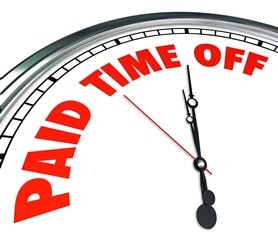
Claiming PTO After an Accident
When you’re hurt in an accident by a negligent driver, you can usually file a personal injury claim to recover damages from the liable party or their insurance company. If you had to use your PTO after an accident, you may wonder if you can get back that time you were likely saving for a more pleasant occasion.
While a Virginia car crash lawyer cannot help you get back your vacation days—only your employer has the power to restore them—we can help you get compensated for the PTO you should have been able to use for your own personal reasons.
You may be eligible for compensation for lost PTO if you used it for:
- Your hospital recovery
- Going to follow-up doctor appointments
- Speaking to an insurance company or adjuster
- Meeting your Virginia car accident attorney
How to Document Your PTO
Your PTO has its own value, often based on how much money you earn. Usually, one day of PTO is worth as much as one day’s labor. So if you make $150 per day, then one day of PTO is worth $150.
However, PTO has additional value: it’s time that most employees spend by themselves or with their families.
Virginia’s courts recognize exhausted PTO as a form of damage and will let you file a claim for recovery—provided you have documentation of your loss.
Most of the time, your employer can help you get the documentation you need. You should ask for a form or statement which:
- Is printed on company letterhead
- Lists your name, title, and salary
- Details how much time you missed or how much PTO you had to use
How an Attorney Can Help
You should never have to bear the financial burden of another person’s negligence. Not only do you deserve compensation for your missing PTO, you should also be compensated for the money you’ve already spent on hospital bills and the money you’ll need for physical rehabilitation and follow-up appointments. A Virginia car crash lawyer will help you evaluate the sum of your damages, which may include:
- Exhausted PTO
- Car repairs
- Medical bills
- Physical rehabilitation
- Continued care
- Crutches, wheelchair ramps, other medical accessories
- Emotional pain and suffering
- Loss of enjoyment
- Disfigurement
Virginia, unlike other states, does not have a cap on damages in car accident cases. So, your attorney will fight to get you all the financial assistance you need. In certain cases, you may even be able to request punitive damages—a special sort of financial penalty levied on people, entities, or organizations which were exceptionally negligent in causing your accident.
Once you have decided to file a claim for damages, a lawyer will act as your advocate: collecting evidence needed to bolster your case, negotiating with the insurance company, and taking anyone who refuses to be fair to court.
Contact Us Today
If you or a loved one suffered injuries in a Virginia car accident, send Kearney, Freeman, Fogarty & Joshi a message online today. Your initial consultation with us is free, and we handle our personal injury work on a contingency fee basis. That means, you pay no legal fees unless there is a financial recovery.
|
Related links: |
When you get hurt in an accident that was not your fault, you should never have to pay for damages. However, getting fair compensation can be challenging. If you try to handle the claim on your own, the insurance company may be reluctant to offer you a fair deal; however, an attorney can help maximize your claim, especially if you act fast. 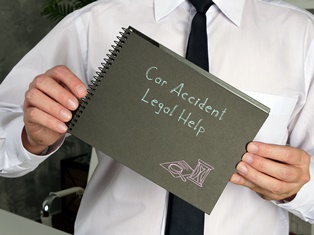
The Right Time to Contact a Car Crash Lawyer
If you are recovering from a car accident and contemplating a personal injury claim, you may not know when or how to contact an experienced Virginia attorney. You might think it is best to negotiate directly with an insurance adjuster or accept a settlement that covers the costs of your immediate medical expenses.
However, lawyers know that insurance companies will rarely offer a fair settlement to people who lack legal representation. Because insurance companies are for-profit businesses, they want to pay as little money as possible to help protect their bottom line. They will do everything they can to decrease the value of your claim.
When you take quick action by calling an attorney, they will help guide you through the claims process by:
- Collecting and preserving important evidence. Even if your case seems open and shut, the insurance company will still demand evidence of your damages, photographs of the crash site, repair estimates, and hospital bills. Lawyers know what evidence to gather for settlement negotiations or for court.
- Speaking to the adjuster on your behalf. Many people do not know that speaking to an insurance adjuster can be very dangerous to their claim. Adjusters will use anything you say against you. If you have an attorney, they will help you avoid mistakes that could end up hurting your claim.
- Advocating on your behalf. Insurance companies do not like it when claimants get legal help because they know lawyers are well aware of their tricks and won’t give in low-ball settlements. When you have an attorney, you have an advantage: someone who knows the insurance industry and is willing to do whatever it takes to get you the compensation you deserve.
Since evidence can disappear and adjusters can be smooth talkers, you should always contact an attorney as soon as possible. If you call quickly enough, an attorney may be able to dispatch investigators to the scene of the accident. In some cases, a legal team can reach a crash site before police or other emergency services. The sooner you reach out, the better your chances are of a fair settlement.
The Importance of Acting Fast
You should never wait too long to file a personal injury claim. The insurance company will be working hard to de-value your case, and you must file within a certain timeframe.
Virginia, like every other state, has a statute of limitation for how long someone has to file an injury claim, civil action, or lawsuit. In Virginia, most people have two years from the date of injury in a car accident to take action.
Once the statute of limitations has passed, not even the best lawyer can help. If your case is not automatically dismissed by the courts, the insurance company will tell the judge that your complaint was filed too late, and it will be immediately dismissed.
Contact Us Today
The law firm of Kearney, Freeman, Fogarty & Joshi has years of experience handling Virginia car accident claims. We know that a crash can be expensive, which is why we never charge you anything up front. We work on a contingency basis, meaning we only get paid if you do.
Send us a message online to schedule your free consultation today.
|
Related links: |
Even when you’re involved in a minor fender bender, the experience can be overwhelming, especially if you were injured or given a major repair bill for your vehicle. You may not be sure if insurance will help you pay for the damages. While you may have already considered taking legal action against the at-fault driver, you might still be unsure if a lawyer’s intervention would really make a difference. You may also wonder whether it is simply too soon to call an attorney, especially if you are waiting for the insurance company to write a check or offer a settlement. 
If you were injured in a car accident, obtaining legal representation is essential for making a fair recovery. A Virginia car accident attorney can help you get the compensation you deserve.
It’s Never Too Soon to Call an Attorney
If ever you’re involved in an automobile accident, a personal injury attorney should be the first person you call. This is especially true if:
- The crash resulted in significant physical injury or death
- You aren’t sure who was at fault
- The police report is inaccurate
- You aren’t sure about your insurance coverages
- Your insurance company offers an insufficient settlement
- The other motorist’s insurance company will not take responsibility for your medical bills
Your personal injury attorney will immediately initiate an investigation into the accident, its causes, and your potential compensation. If you call immediately after the crash, they may even be able to dispatch a quick-response team to the site. This team will begin collecting evidence, helping to ensure that no one—not the other motorist nor an insurer—can dispute the facts.
Even if your personal injury attorney does not believe you should file a claim, they will still provide critical advice to minimize your liability and expedite your financial recovery.
Why You Shouldn’t Wait Too Long
While it is never too soon to call a personal injury attorney, it can be too late. If you want to file a personal injury claim in Virginia, you are expected to do so within a particular timeframe. This timeframe is called the “statute of limitations.” Every state, and even the federal government, has its own statute of limitations.
In Virginia, the statute of limitations for filing a car crash claim or lawsuit is usually two years from the date of the accident or resultant injury. Although there are some exceptions to the statute of limitations—if, for instance, a victim does not discover an injury until later—the court will not usually offer extensions. This is why it is very important that you contact a personal injury attorney as soon as possible.
How an Attorney Can Help
A Virginia personal injury attorney can assist you in many ways. They can help:
- Deal with the insurance company. While you may think your insurer is on your side, adjusters and other agents want to save their employer as much money as possible—even if it means paying out less than you deserve. Your attorney will negotiate with the insurer for the best settlement and take them to court, if necessary. Statistically, you are more likely to receive a larger settlement if you retain legal counsel.
- Instruct you on collecting necessary documents. An attorney can explain which medical and other documents to collect and save that could be critical to your case.
- Reduce uncertainty. An attorney can reduce any anxiety and uncertainty you may have about your claim/case and its outcome. Since your attorney will be invested in the results of your case, they will dedicate immense resources to investigating your accident, calculating your damages, and fighting for your maximum compensation.
Your attorney’s end goal is your recovery. That means, your lawyer will do everything possible to ensure you do not have to pay anything out of pocket for an accident that was not your fault.
Contact Us Today
If you were injured in a car accident, it is never too soon to contact a Virginia car crash attorney. Send Kearney, Freeman, Fogarty & Joshi a message online today, and schedule your initial consultation.
|
Related links: |
If you have been injured in a Virginia car accident that was not your fault, you know you shouldn’t be responsible for paying for costly car repairs, medical expenses, and physical rehabilitation. So, you may wonder when you can expect your settlement check from the insurance company. While you may be fortunate to receive a payment check within a matter of months, the other driver’s insurer will be in no hurry to negotiate a settlement. In fact, they may be inclined to delay negotiations as long as possible. To accelerate the receipt of your check and possibly increase your compensation, you need a personal injury attorney working for you. 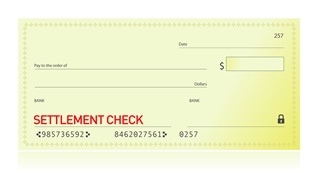
Reaching a Settlement After Your Accident
After being involved in a Virginia car crash, you should immediately call a personal injury attorney. They will begin collecting evidence related to the accident and working to establish the other driver’s negligence. They will then begin the settlement process which consists of several steps, including:
- Filing a claim. Your attorney will cross-check the negligent driver’s insurance policy and then notify their carrier that you have decided to file a claim.
- Starting an investigation. Once the initial claim has been filed, your attorney will continue the investigation. They may requisition police reports and medical documents, as well as interview eyewitnesses. The investigation will also incorporate evidence of your damages such as medical expenses and lost income.
- Calculating your damages. Your attorney will not begin settlement negotiations until he knows the maximum amount you may recover. Often, this amount is not immediately obvious. While you may have a car repair estimate, a period of time with lost wages, and medical bills, you may require damages for future expenses, too. Your doctor may recommend corrective surgery, tell you take more time off work, or suggest extensive physical rehabilitation.
- Sending a demand letter. After your attorney is confident they’ve collected all the necessary evidence and calculated your damages, they will send a demand letter to the at-fault motorist’s insurance company.
- Initiating negotiations. The at-fault driver’s insurance company will almost certainly offer a lower settlement than what you deserve. Your attorney wants what is best for you, not the insurer, and will negotiate for a higher award.
If the insurance company refuses to negotiate or pay a higher settlement, your attorney may decide the best course of action is to file a personal injury lawsuit.
Your Timeline
Often, the biggest obstacle to receiving an expedient settlement is the negotiations stage of a claim. Depending on the circumstances of your claim, you may have a check in-hand as early as three months. However, complicated cases often take longer to settle and could take years to fully resolve.
Claims can take longer to settle if they involve:
- Insufficient evidence
- Wrongful death
- Multiple defendants
- Improper or poorly-calculated claims of damages
- An uncertain medical recovery timeframe
- Catastrophic injuries
But once you, your attorney, and the insurance company agree on a settlement, you will rarely have to wait a month beyond the conclusion of a successful negation to see a check. Sometimes, it may come within a week.
Getting Started With Your Settlement
When you are physically injured, emotionally devastated, and in desperate need of assistance, you cannot afford to wait for the insurance company to take its time addressing your claim. The first step to getting paid is simple: contact a personal injury attorney immediately after your accident. Even if you are certain that the other driver was at fault, insurance companies are businesses that want to protect their profits. They may deny your claim on frivolous grounds, claim you caused the accident, or offer less money than you deserve and an amount that can’t possibly pay for your accident-related medical expenses.
Contact Us Today
The sooner you file a claim and initiate negotiations, the sooner you can get paid and start on the road to recovery. Kearney, Freeman, Fogarty & Joshi can help you get the settlement you deserve. If you or a loved suffered injuries in a Virginia car accident, send us a message online to schedule your initial consultation.
|
Related links: |
Losing a loved one is never easy. Often, it can be harder to overcome grief when a relative’s life was taken by another person’s negligence. You may have lost a wage-earning spouse or have to pay for a funeral that should have happened years in the future. No matter the circumstances, you may consider filing a wrongful death claim. 
While taking another person to court is a profoundly personal decision, an attorney may be able to help you recover monetary losses to ensure your family’s financial stability. In some cases, a wrongful death lawsuit can be a powerful force for change, with the potential to punish negligent parties and force reckless corporations to adopt safer policies.
Reasons to File a Wrongful Death Lawsuit
There are many reasons people are motivated to file a wrongful death claim; however, the most common are:
- To recover damages. When someone files a wrongful death lawsuit, they are typically not looking to capitalize on their loss for financial gain. However, the death of a loved one can be financially devastating. Monetary compensation can help provide important financial support and security for the family. This is especially critical if the deceased was the primary wage earner.
- To hold the negligent person accountable. Depending on the circumstances, a person whose negligence takes another person’s life may not face criminal charges. Filing a wrongful death claim can hold the negligent party accountable. Even though the person will not go to jail, they may be made to make monetary restitution to the family.
- To deter future acts of negligence. A wrongful death lawsuit can serve as a powerful agent for change. Critical settlements and/or court verdicts can occur, and word can spread through media coverage. This news can influence the behavior of others who might re-think their own behavior and act more carefully in the future, thus saving lives.
- To get closure. For people who suffer the death of a loved one, a successful wrongful death lawsuit can provide a sense of closure and justice for the one they lost.
Who Can File a Wrongful Death Claim in Virginia
Not everyone can bring a wrongful death claim in Virginia. Only a “statutory beneficiary” is allowed to file. This means, only those family members or dependents who can recover in a wrongful death claim can lawfully file. Section 8.01-53 of the Virginia Code prioritizes these family members in the following specific order:
- The surviving spouse, children, or grandchildren of the deceased
- The parents, brothers, or sisters of the deceased, or any relative who was primarily dependent on the deceased
- A surviving family member who can inherit the deceased’s estate
There is also has a deadline for when wrongful death claims can be filed. Virginia law requires that wrongful death claims be filed within two years of the deceased person’s death. If a claim is not filed within those two years, the statute of limitations will prohibit the case from being heard by the court.
The Process of Filing a Complaint
If someone has standing to file a wrongful death claim and potentially benefit from its outcome, they and their attorney can bring a complaint before the court.
Before getting started, the family’s attorney will likely conduct an investigation into the fatal accident. Because you’ll need to prove that the at-fault party was negligent or responsible for the death of your loved one, your attorney will gather and evaluate evidence as it relates to your case.
Once the grounds for a case have been firmly established, your attorney will draft the complaint paperwork and determine the appropriate county in which to file the lawsuit. This is typically the county where your loved one lived, and the case must be brought to a court that has jurisdiction over the case.
Your lawyer will then serve formal notice of the complaint to any business or person that will be named as a defendant in the case. After they respond, the case will move forward.
You Don’t Have to Fight Alone
Filing a wrongful death claim does not have to be stressful. While initiating a complaint means filing a lot of paperwork and sending out notices, you do not have to do any of this yourself. An experienced Virginia wrongful death lawyer can help guide you through the process, saving you time, money, and stress. KFFJ Law has years of experience helping Virginians get justice for their loved ones, even when it seems out of reach.
You should contact an attorney if you have lost a loved one in a:
- Car accident
- Motorcycle accident
- Semi-truck accident
- Bus or train accident
- Boating accident
- Drunk driving accident
- Distracted driving accident
- Multiple-car accident
- Catastrophic injury accident
- Fatal injury accident
Contact Us Today
If you have lost a loved one to another person’s negligence, you do not have to go through it alone. KFFJ Law’s team of experienced attorneys knows and understands Virginia personal injury and wrongful death laws. We know what courts and insurers want to see, and we know how to get it. Send us a message online, or call us today to schedule your free initial consultation.
|
Related links: |
If you are injured in an accident that was not your fault, you may not feel you need to hire an attorney. But before you file a personal injury claim on your own and negotiate directly with the liable person’s insurance company, it’s important to understand that insurance companies operate as a business. Their ultimate goal is to pay out as little money as possible for every claim. They do not have your best interests at heart but rather their bottom line, and they’ll use many types of underhanded tactics to make sure they reduce the amount you receive.
It can be tempting for accident victims to accept the very first offer an insurance company makes, but in most cases, this will never be the amount you deserve. Working with an attorney who is experienced with car accident settlements means victims will usually recover more in damages. 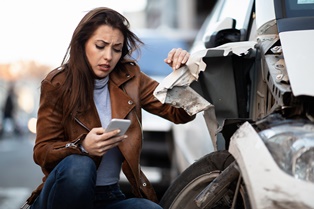
What You Can Recover After a Car Accident
If you’re injured by a negligent driver, working with an experienced attorney can help ensure that you receive all the compensation you are entitled to. It’s possible to receive damages for the following:
- Medical expenses for the treatment you’re receiving and care you might need in the future
- Lost wages if you were unable to work during your recovery
- Lost potential income if you suffered a permanent disability
- Pain and suffering for the mental, physical, and psychological pain you experienced
Call Us After a Car Accident
At Kearney, Freeman, Fogarty & Joshi, we work with personal injury clients on a contingency basis, so you can hire us without paying anything up front. We only collect fees when you are awarded damages. Our initial review of your case is completely free, and we are happy to come to the hospital or to your home to meet with you. Protect your rights, and call us today.
|
Related links: |
Broken rib injuries are not uncommon in Virginia car accidents. On impact, the force of the steering wheel on the chest can be strong enough to damage ribs as well as internal organs such as the lungs or spleen. This type of injury can be scary since it can also interfere with the victim’s ability to breathe. Victims need an experienced car accident attorney to help ensure they get the compensation they deserve. 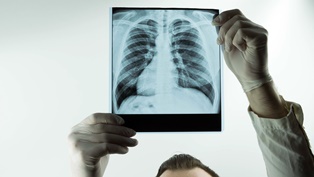
Symptoms and Complications of Broken Rib Injuries
The symptoms of a broken rib might include:
- Pain in the chest area
- Difficulty breathing or shortness of breath
- Painful breathing
- Dizziness and lightheadedness
It is essential that victims who suspect they have a broken rib injury seek medical treatment immediately. Rib bones that are moved out of alignment because of the force of a crash can cause life-threatening punctures and damage to the lungs, blood vessels, soft tissues, and organs. Even with moderate trauma, lung bruising and swelling can develop, requiring emergency care. Older adults are particularly vulnerable to developing pneumonia because they cannot breathe deeply or cough due to the pain of their injury.
Treatment in mild cases usually focuses on managing the pain and limiting strenuous activity. In more serious cases, patients might need a chest tube or other surgery, a blood transfusion, or artificial ventilation.
Recovering Damages After a Broken Rib Injury
An experienced car accident attorney can help you recover damages from the party responsible for the accident, including:
- Medical treatment, including treatment for complications
- Medications
- Physical therapy
- Lost income during your recovery
- Pain and suffering
Call an Experienced Virginia Car Accident Attorney
When you’re injured due to someone else’s negligence, you deserve a fair recovery, but you must act quickly. If you don’t seek compensation within the two-year statute of limitations, you will miss out on obtaining damages. Please contact us for a free, no-obligation consultation to learn about your rights and how we can help your situation.
|
Related links: |
There is no simple answer because every child accident case is different; however, if your child is injured in an accident, the best course of action is to make an appointment for a consultation with an experienced child injury attorney. They can evaluate your child's case and the potential value of your claim. Because personal injury attorneys work on a contingency basis, you have nothing to lose by making an appointment. 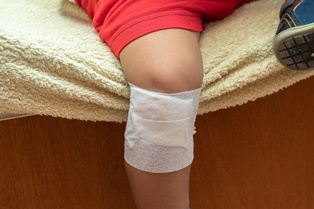
How Child Injury Accidents Happen
Some of the most common causes of injuries to children include:
- Car accidents. Kids can be injured while they are passengers in a vehicle or while they are crossing the street or riding a bike, scooter, or skateboard.
- Playground accidents. Kids frequently get hurt at playgrounds, especially when playground equipment is not properly maintained or if children are not supervised properly.
- Child abuse. Younger children and children with special needs are particularly vulnerable to child abuse injuries because they lack the ability to defend themselves.
- Other causes. Children can be injured in swimming pools, by accidental poisoning, in slip and falls, and from burns from stoves or open fires.
Recovering Damages on Behalf of Your Child
Children who are under the age of 18 are unable to file lawsuits on their own behalf, but Virginia law allows parents to sue for damages. Damages that may be recovered in a child injury claim may include:
- Past and future medical bills
- Loss of wages if parents have to take time off work to care for the injured child
- Past and future pain and suffering
- Disfigurement, scarring, or permanent limitations
- Property damage and other incidental expenses sustained due to the negligence
Contact a Fairfax Personal Injury Attorney
When your child is injured by the negligence or criminal acts of another, they have the right to recover damages. Call a child injury lawyer to set up a free, no-obligation consultation.
|
Related links: |
When you’ve been injured in an accident with a delivery truck, obtaining a fair settlement requires different evidence and sometimes more aggressive litigation than if you were in a crash with a car. Drivers in accidents with commercial vehicles often suffer very serious injuries, and the insurance companies for the defendants are likely to lose a lot of money in a personal injury case. Thus, they will fight hard to save money.
What to Do After You’re Injured by a Delivery Truck
 If you’re not seriously injured, there are important steps to take following a truck accident. After calling 911, you should:
If you’re not seriously injured, there are important steps to take following a truck accident. After calling 911, you should:
- Take pictures and/or videos. If you can, photograph the accident, the cars involved and their damage, and the street area where the crash occurred. These pictures can provide significant evidence for your personal injury case. Also, take pictures of your injuries and any other evidence that could help prove the truck driver was at fault.
- Gather contact information. It’s important to collect contact information from the people involved in the crash, as well as from any bystanders and eyewitnesses. This includes names, addresses, and insurance information. If eyewitnesses are willing to be recorded, take a phone video of their conversation with you.
- Restrict your information. Don’t admit blame to the police or any insurance company adjusters who may be sent to the scene. Don’t give a recorded statement to anyone, and don’t talk about your injuries. For example, if you make a general comment such as “I’m okay,” it could harm your case later. And your assessment may simply not be true. You could have serious injuries that have not presented yet.
- Contact an experienced, skilled truck accident attorney. Truck accident cases are often very complex and involve many potential liable parties. It’s important to have a skilled truck accident attorney on your side to give you the best chance of obtaining fair compensation.
Contact Kearney, Freeman, Fogarty & Joshi, PLLC
If you were injured in an accident with a delivery truck, a personal injury case can be complex and require a great deal of evidence. Depending on the nature of your injuries, you could be disabled and out of work for a significant period of time. The attorneys at Kearney, Freeman, Fogarty & Joshi can help.
Call us today for a free, no-obligation consultation. Our attorneys will work to help you negotiate a fair truck crash settlement. Because we work on a contingency basis, you pay nothing up-front. We only get paid when you get paid.
|
Related Links: |
Many people who are injured in a car accident want to know how much their case is worth. But there is no formula or calculator to determine the amount of damages you might receive. Instead, your compensation will be based on a number of factors, including the extent of your injuries, the quality of gathered evidence, and the expertise of your legal representation. 
Understanding How Personal Injury Damages Are Determined
Some of the costs you have incurred because of your injury such as medical bills and lost income are relatively easy to prove as long as you have copies of bills and pay stubs. If you are unable to return to your job, you may receive compensation for potential income losses. These can be more difficult to prove, but it can be done with a well-presented case that includes expert witnesses.
Pain and suffering is often a significant part of your financial recovery, and the amount you receive is usually based on statistical data from the insurance company. An attorney can advocate for you by gathering relevant evidence to show how your injuries interfered with your daily life. This can include:
- Medical records
- Photographs of your injuries
- Pharmaceutical bills, particularly for painkillers
- Expert testimony from a physician about your injuries
- Testimony about changes in your behavior or ability to do everyday tasks
- Records about changes in your performance in school or work
- A journal recording when you experienced pain and mental discomfort
Contact a Virginia Car Accident Attorney
Don’t navigate the legal system alone. If you’ve been injured in a car accident, you have a better chance of receiving the damages you deserve if you work with an attorney. Give us a call, or fill out our confidential contact form.
|
Related links: |
The Metrorail, which is operated by the Washington Metropolitan Area Transit Authority (WMATA), is one of the busiest transit systems in the nation. The system serves commuters in Maryland, Virginia, and the District of Columbia. Even though officials are responsible for keeping commuters safe, WMATA often receives criticism for its oversight of safety measures. Metro accidents include serious collisions and derailments and personal injuries that happen to people in stations, waiting areas, and elevators. 
Common reasons injuries occur at WMATA stations include:
- Poorly maintained stations and waiting areas that can cause slip and falls
- Falling objects
- Failure to accommodate people with disabilities
- Improperly maintained or serviced elevators
Compensation From WMATA Personal Injury Accidents
Being injured in a metro station accident takes a physical and financial toll on victims. Every personal injury case is unique, but typical compensation for personal injury accidents includes:
- Medical bills and hospital expenses
- Physical therapy and rehabilitation costs
- Lost wages and potential reduced income
- Pain and suffering
Why You Need a Lawyer
Because WMATA is a tri-jurisdictional government agency, it can be tricky to bring a case against it. For a regular personal injury claim in Virginia, the statute of limitations is two years. But if you intend to take action against the WMATA, you must file within one year of the incident. You can improve your chances of having a successful case and receiving the maximum amount of damages by working with an experienced personal injury lawyer. Navigating the claims process and working with insurance companies without representation by an attorney can be a costly mistake.
If you were injured at a WMATA station, call us for a free, no-obligation consultation. Our attorneys will go over the details of your case and gather evidence that may prove your injury happened because of negligence on the part of WMATA. You will pay no up-front legal feels. We work on a contingency basis, so we only get paid if you recover damages.
|
Related links: |
A collarbone fracture is a common car crash injury. It frequently happens when the seatbelt that saved your life by holding you in place pulls with so much force, your collarbone, also called a clavicle, simply snaps. The collarbone connects the upper part of the breastbone to the shoulder, so it is in a prime location for injury from the force of the seatbelt. Seek prompt medical attention if you suspect yours is broken. 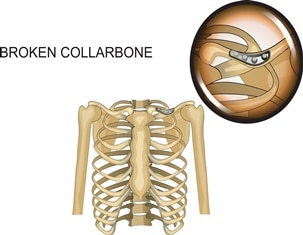
Diagnosis and Treatment of a Clavicle Break
If your shoulder is sagging downward and forward after a crash, and you cannot lift your arm because it’s too painful, you need to see a doctor. A physician will examine the injured area and take X-rays to identify a collarbone break.
Treatment of a broken collarbone includes:
- An arm sling
- Over-the-counter pain medication
- Physical therapy as the bone heals
For more serious breaks, you might need surgery.
Potential Complications
Your broken collarbone will likely keep you out of work for a while, but in most cases, treatment goes smoothly and you’ll be back to normal in just a few months. Sometimes, however, the following complications can prevent a smooth healing process:
- The area in the body where your collarbone is located contains many nerves and blood vessels. If you have numbness around the area, this could mean the jagged edges of the broken bone created some additional damage.
- If your bone broke through the skin in the crash, this could lead to the injury site becoming infected.
- As the collarbone fuses back together, there is sometimes a lump visible through the skin at the site. Although the lump often goes away over time, it is permanent for some people and can leave them feeling self-conscious.
Call a Virginia Car Accident Attorney
A collarbone fracture is a painful injury, but you may be able to recover damages for your medical bills, time missed from work, and other expenses. Talk to an experienced car accident attorney as soon as possible after the crash. Schedule a free consultation today.
|
Related links: |
If you are bitten by a dog in Virginia, you can handle the case without an attorney, but you shouldn’t. Having a personal injury attorney on your side can save you a lot of stress and help maximize your potential compensation. 
Why You Need an Attorney
Although victims survive the vast majority of dog bites, many find themselves needing reconstructive surgery to repair the damage caused by the attack. Dog bite injuries include lacerations, puncture wounds, nerve damage, crushed bones, and torn ligaments, tendons, and muscles. Costs related to the injuries can add up—not only for medical treatment but for lost wages and pain and suffering.
If the dog that bit you belongs to a friend or family member, having an attorney is crucial to handle the negotiations. You might be worried that suing could ruin your relationship and could be financially devastating for them. If they have renter or homeowner insurance, their insurance company will likely cover the costs of your injury claim. However, their insurance premium will probably go up.
When you have lost a loved one because of a dog attack, you are likely struggling to come to terms with the loss and unsure of what to do. An attorney will be invaluable during this difficult time, helping you build a case against the owner of the dog, so they are held responsible for the devastating loss.
Contact a Virginia Dog Bite Attorney
If you were injured because of the negligence of a dog’s owner, you have legal options for recovering damages. A personal injury claim can cover your medical expenses, lost wages, and other costs. Working with an experienced attorney can help ensure you get the compensation you deserve. For a free consultation about your dog bite case, contact Kearney, Freeman, Fogarty & Joshi, PLLC, in Fairfax, Virginia.
|
Related links: |
When you are involved in a car accident, it’s not unusual to be unable to remember the crash or the moments leading up to it. This memory loss makes many accident victims wonder if they’ll be able to pursue a legal case. Chances are, you may still recover damages, although every situation is unique. Contact an accident lawyer as soon as possible after the accident. 
Causes of Memory Loss After an Accident
Although many believe memory loss occurs because an event may have been too traumatic and the mind wants to forget, the truth is that the brain’s focus is on survival rather than creating memories. This is what is known as the “survival response.”
Additionally, head injuries are a common cause of memory loss. A blow to the head can cause a concussion, edema, a skull fracture, and/or a traumatic brain injury (TBI). Many victims experience memory loss as a result.
Filing a Claim When You Cannot Remember the Accident
Although accident victims may not be able to remember the details of the crash, they still deserve to be compensated for their injuries. With the help of an experienced attorney who can conduct a full investigation into the negligence that caused the accident, there are ways to piece together the details of the crash by gathering the following evidence:
- Medical reports
- Police reports
- Eyewitness testimony
- Videos from traffic or security cameras
- Photographs taken at the scene
Although the chaos that occurs after an accident can make it difficult to remember specific details about what happened, it’s helpful to write down whatever you can remember about the incident as soon as possible afterward.
Call Our Northern Virginia Car Accident Lawyers
If you suffered injuries because of the negligence of another driver, you may be entitled to compensation—even if you cannot remember the crash. An experienced attorney can provide assistance in helping you gather evidence to support your claim against the other driver. You may be able to recover damages for your medical expenses, lost wages, pain and suffering, and property damage. Call us today to schedule a free, no-obligation consultation.
|
Related links: |
If you have been injured in a car accident, you expect that your medical treatment will be paid for by the at-fault driver’s insurance company. When your treatment includes chiropractic care, you will need to prove that it is essential to your recovery to have the costs covered under your claim. 
How a Chiropractor May Help With Your Injuries
Anyone who is in a car accident should receive immediate medical attention—even if they don’t think they’ve suffered any injuries. Soft tissue injuries, including backaches, neck pain, stiffness, and soreness, often don’t show up until hours or days after the crash. If your physician is unable to do much in the way of treatment other than prescribe pain pills, you might decide to see a chiropractor for these types of injuries.
Chiropractic sessions might provide the following benefits to accident victims:
- Spinal adjustments to bring the spine back into alignment, which can increase neurotransmitters and hormone levels, positively impacting the central nervous system
- Breakdown of scar tissue that can cause stiffness and soreness after an accident
- Pain control and decreased need for prescription pain medication
- Range of motion restoration, which can help with the healing process
- Management of minor injuries, so they don’t become worse or chronic
Paying for Chiropractic Care After an Accident
Medical care may be needed for a full recovery following an accident, but you will have to prove that chiropractic care is an essential treatment. Document everything, including records from your physician, as well as the following:
- A list of all symptoms
- Treatment records from your chiropractor
- How treatment has helped with your injuries
Be sure not to delay getting treatment after your accident. Waiting too long could make it more difficult to prove that your injuries were the result of the car accident. Having an experienced attorney on your side, as well as the proper medical documentation, can help you get the settlement you deserve.
Get the Full and Fair Recovery You Deserve
If you've been injured in a car accident, you need to speak with an experienced car accident lawyer as soon as possible. Call today to make an appointment for a free consultation.
|
Related links: |
If you experienced road rash injuries in an accident that wasn’t your fault, you may have a case against the at-fault party for damages. Road rash is a common term for an injury that causes part of the skin to be rubbed off. When a collision throws a motorcycle rider onto the road surface, the abrasions can cause serious damage to the skin. 
Different Degrees of Road Rash
There are different degrees of road rash, including:
- First-degree road rash. The most minor type of road rash gives skin the appearance of a bad sunburn. This type of abrasion usually doesn’t break the skin or cause more than minor scrapes.
- Second-degree road rash. This type of abrasion breaks the top layers of the skin, and debris such as dirt and rocks is often lodged in the wound. Although treatable with over-the-counter remedies, if the injured party gets proper medical attention, this can reduce the chances of permanent scarring.
- Third-degree road rash. When all five layers of the skin have been scraped off, you might be able to see tissue, muscle, fat, or bone. Immediate medical treatment is necessary. There is a high risk of infection with this type of road rash.
Consequences of a Road Rash Injury
When you have suffered road rash in a motorcycle accident, you will likely incur significant medical expenses. In addition to medical treatment, you may even require cosmetic surgery. You may lose income if you are unable to work while you recover. If you have severe disfigurement because of the road rash, you might be unable to return to work because of your altered appearance. This could mean reduced income earning potential in the future.
There are also non-economic damages to consider, including trauma and pain and suffering. These are more difficult to quantify, which is one reason it is so important to speak to a motorcycle accident lawyer.
Virginia Motorcycle Accident Injury Attorneys Offer Personalized Service
If you or a loved one suffered road rash or other injuries in a motorcycle accident, you need an experienced lawyer on your side. Call us, so we can go over the details of your case.
|
Related links: |
Most drivers have seen aggressive drivers on the road. Aggressive driving is any behavior that is intended to harass, intimidate, or injure another driver. Aggressive driving can become even more dangerous with the driver exhibits “road rage” which is considered a serious criminal matter because the driver who is overcome by road rage ultimately hurts someone else. That driver may wield a weapon, run into the other driver’s car, or try to corner the other driver by jumping out of his car to physically confront him. 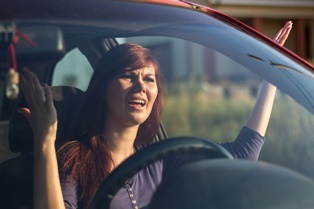
If you suffer an injury in an accident with an aggressive driving or someone engaging in road rage, they may face criminal charges. You may also file a civil case against the driver to recover damages.
Behaviors That Constitute Reckless or Aggressive Driving in Virginia
Most people know the signs of reckless or aggressive driving. These include:
- Speeding
- Following too closely (tailgating)
- Failing to stop or yield the right-of-way when appropriate
- Driving outside of marked lanes
- Making unsafe lane changes
- Cutting off other drivers or preventing them from entering the roadway
- Passing illegally
Aggressive driving with the intent to injure another driver is a Class 1 misdemeanor in Virginia. Penalties can include fines and jail time (no longer than 12 months). If no one is injured in an aggressive driving incident, the charge might be a Class 2 misdemeanor. Offenders may also be required to participate in an aggressive driving program.
Filing a Civil Claim After a Road Rage Accident
Whether or not the at-fault driver is been charged with a misdemeanor in an aggressive driving incident, you can still file a personal injury lawsuit if you suffered injuries during the accident. You will have to show that the other driver violated one or more of the offenses listed in the Virginia Code, and the driver had the intent to harass, intimidate, or injure another person.
Contact an Experienced Attorney
Your chances of making a fair recovery of damages after a road rage accident is better with the help of an experienced lawyer. Your lawyer can help deal with the complexities of a complicated aggressive driving case, including police investigators, eyewitnesses, insurance companies, medical expenses, and in some cases, wrongful death.
Please contact us for a free, no-obligation consultation to learn about your rights and to discuss the details of your case.
|
Related links: |
If you are injured because of a car crash that involved someone else’s negligence, suing the other driver can help cover your costs for mounting medical bills and lost income. In the state of Virginia, however, a damage cap may place a limit on how much you can recover. 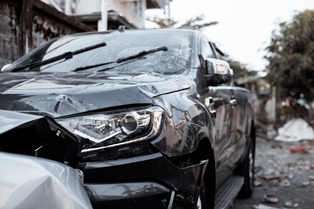
The Definition of a Damage Cap
When you sue someone after being injured in a car accident, you are usually seeking compensation for economic and non-economic damages. With a damage cap, this will limit the amount of money you’re awarded. Damage caps are put in place to avoid large-payout verdicts that jurors sometimes make based on emotion and negatively impact the economy.
In Virginia, certain damage caps may limit the amount of compensation you can recover in your case. If punitive damages are a consideration in your situation (which happens only in rare cases), this means the at-fault driver is found to have acted in a reckless or outrageous way that is deserving of punishment. Damages are capped at $350,000. If your accident involved a minor who damaged your property, you will only be able to collect $2,500 from their parents.
Types of Damages You Might Get in a Car Accident Case
Some of the economic damages you might be able to recover include:
- Cost for car repairs
- Medical expenses
- Lost wages
Non-economic damages can be tougher to estimate, and these can include pain, suffering, and loss of enjoyment of life.
The best way to ensure that you receive maximum compensation for your damages is to work with an experienced car accident attorney.
Our Fairfax Car Accident Lawyers Can Help With Your Injury Case
Virginia is one of a few states that applies a standard known as “contributory negligence.” This means that accident injury victims who are found to have contributed to the accident in any way—even if they are deemed just one percent at fault—they may not be able to recover damages. It’s crucial that you work with an attorney who has experience with this type of challenging case. Contact the law firm of Kearney, Freeman, Fogarty & Joshi to schedule a free, no-obligation consultation.
|
Related links: |
If you receive a settlement for your personal injury lawsuit, it’s likely you won’t have to pay federal taxes on the amount. However, there are exceptions, and it’s important to know the factors that affect whether or not you’ll have to pay. 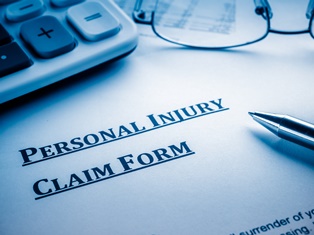
After You Get a Personal Injury Settlement
Once you get your settlement amount, your lawyer will deduct legal fees from the full amount, leaving you with the rest. In general, neither the federal government nor the state of Virginia will be able to collect any proceeds that you received in your personal injury lawsuit that compensate you for physical injuries. This includes damages that compensated you for lost income at work, medical expenses, and pain and suffering. These are called compensatory damages.
There are exceptions to this rule, however. If you received punitive damages, this amount will be taxable. In addition, if you have a claim for emotional distress or employment discrimination but did not suffer an actual physical injury as a result, this settlement amount will likely be taxable. Insurance companies typically cut one settlement check, which will not account for the different types of damages.
Work With a Tax Professional
When it comes to questions about taxes or dealing with the Internal Revenue Service, it’s always best to contact a tax professional. The federal government will have access to your settlement information, and the insurance company will likely submit a 1099 form to report the amount of compensation you received. Every personal injury settlement is different, so you will need to get advice on yours from a qualified tax professional to determine if any taxes will be due.
Call Us for Help
Have you been injured because of another person’s negligence? Please contact us for a free, no-obligation consultation to learn about your rights and to discuss the actions we can take on your behalf to recover the damages you deserve. Since we work on a contingency fee basis, you won’t owe us any upfront legal fees. We don’t get paid until you do. To learn more, please contact us here.
|
Related links: |
A lien is a security interest placed by one party against another party’s property. For example, if you borrow money to buy a car, the bank places a lien on the title until the loan is paid in full. This means, you cannot sell the car until you’ve paid off the loan and the bank releases the lien.
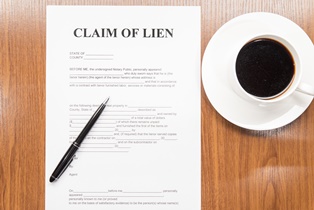
Medical liens are similar, but instead of loaning money, medical care providers treat an injured party without getting paid right away, retaining the right to be paid for those services with a lien. The lien in this case is against the settlement money from your personal injury case. A healthcare provider agrees to treat you in exchange for your agreement to pay the provider once your personal injury claim has been resolved.
Medical Liens Make Personal Injury Claims More Complicated
This type of a lien is often unavoidable because injured people need immediate treatment, and that treatment is often expensive. Incurring a lien on a personal injury claim makes resolving your personal injury claim a bit more complicated. The final lien amount has to be double-checked to ensure it covers only treatment that was related to the accident.
There may be room for negotiation of the final amount owed if the claim amount is insufficient to fully compensate you for your injuries. In most situations, a personal injury attorney will try to negotiate with healthcare providers to get them to accept less than the amount of the lien.
Call Us for Help
Lien law is extremely complicated, and most people will find it difficult to navigate without the assistance of an attorney. Please contact us for a free, no-obligation consultation to learn about your rights and to discuss the actions we can take on your behalf to protect the recovery you deserve. We work on a contingency fee basis. This means, you won’t owe us any upfront legal fees, and we will be paid when your case is settled or resolved in court. To learn more, please call, or contact us through our website.
|
Related links: |
If you are a pedestrian injured in an accident and you have no health insurance, you may wonder how you can get the medical treatment you need and who will pay for it. You may also wonder why the person who was responsible for your injuries isn’t required to pay for your medical care. However, the only thing the law requires is that the at-fault party pay any damages you are owed as a result of a lawsuit. 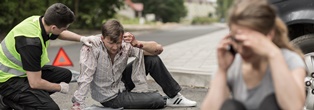
Options for Covering Medical Bills
Even if you do not have health insurance, it’s crucial that you get medical treatment after you’ve been injured in a crash. This creates documentation of your injuries, which will be useful when filing auto insurance or other claims.
There may be options available for you to get at least some of your medical bills paid, including:
- Medicaid coverage. This is a federal health insurance program that provides insurance to low-income recipients. If you are injured in an accident and lose your job because of your injuries, you might qualify for Medicaid. Go to your state’s website to find out if you are eligible.
- A payment plan arranged with healthcare providers. Some doctors who treat accident victims with no health insurance are willing to work out a payment plan. Some providers might agree to treatment based on getting paid out of the victim’s settlement. The providers will have to sign a personal injury lien, which will be sent to the victim’s lawyer. The lawyer will pay the healthcare providers before the victim gets any money from the case.
- Your own automobile insurance. Even if you were not driving when the accident occurred, you might still be able to collect from your own automobile insurance policy.
- Filing a case against the negligent driver. If you were injured in a pedestrian accident and you believe that you were not at fault, you should meet with an experienced attorney to help build a strong case, so you can get the compensation you deserve.
To schedule your free initial consultation, contact us online. All personal injury cases are taken on a contingency fee basis. We collect no fee unless we secure compensation for you.
|
Related links: |
Motorcyclists face unique challenges if they are involved in an accident while riding their cycles. One of those challenges is the bias people have about motorcyclists in general. Law enforcement, insurance companies, and those who witnessed the accident often stereotype bikers, assuming they behave in a careless manner, are reckless, and are irresponsible on the road. These prejudices can affect your claim and your ability to obtain fair compensation. 
Reasons Behind Motorcyclist Bias in VA
There are certainly many factors that contribute to the bias against motorcyclists, but some of the most common include:
- Pop culture. In movies and tv shows, people on motorcycles are often considered “bad boys.” In the media, motorcyclists are typically portrayed as those who are wild and like to break the rules and push limits. No matter how untrue, these pervasive images have been shown to the public for a long time.
- Road ownership. Everyone likes to have their own personal space, and this can include space on the road. Other drivers can be irritated or even resentful when they see a motorcyclist near “their” space. Additionally, they may be intimidated by a group of motorcyclists riding together and taking up long stretches of road, even when these groups are abiding by the law and riding safely.
- Nervousness. Motorcycles can navigate the road much more easily than a car, especially when there is traffic congestion. Motorcyclists moving through stalled traffic can make other drivers feel nervous, especially if the driver is worried about visibility or has had a close call with a motorcycle in the past.
How Motorcyclist Bias Can Affect an Accident Claim
Bias against motorcyclists can have a negative impact on a motorcycle crash claim. The bias can make others quick to judge and blame the motorcyclist for a crash, even when it wasn’t the motorcyclist’s fault. Because other drivers, witnesses, and even law enforcement may view a motorcyclist as reckless, this bias can lead to:
- Added liability. In an accident claim, determining liability is extremely important. This is especially true in Virginia, which follows contributory negligence rules. This means, if a crash victim is to blame for an accident in any way, he will be unable to obtain any compensation. For motorcyclists, this can be a significant concern, as it is common for others to assume the biker played at least some role in causing the crash. Motorcyclists may find themselves facing blame that drivers of other types of vehicles would not.
- Lower settlement offers. Insurance companies know this bias exists, and they will use that knowledge to offer a low settlement. They may hope that the fear of this prejudice will keep motorcyclists away from pursuing a claim or from enlisting the help of an attorney.
- Reduced damages compensation. Similarly, it may be the case that a judge or jury awards a motorcyclist less compensation than deserved. They, too, may give in to false ideas of a motorcyclist’s careless, unsafe behavior.
If you or someone you love suffered injuries in a motorcycle accident, the attorneys at Kearney, Freeman, Fogarty, & Joshi, PLLC will review your case and discuss how bias may influence it. Our legal team has helped many motorcyclists address this unfair prejudice to obtain the compensation they needed to recover as fully as possible after a crash. Call our Fairfax office, or take a moment to fill out the contact form on this page to learn more about how we may be able to help.
|
Related links: |
Car accident victims can suffer a wide variety of injuries in a crash. Physical injuries may be fairly easy to diagnose; however, for victims and their families, there may be emotional consequences that can be more difficult to identify. While not as tangible as a physical injury, the stress, worry, and depression that victims face are just as real. Emotional trauma can have a significant impact on daily life, and victims deserve care and compensation for these injuries just as they would any medical condition. It’s not uncommon for an accident victim to experience post-traumatic stress disorder (PTSD). 
What Is PTSD?
PTSD is a psychiatric disorder that can be experienced by a person who has witnessed or been involved in a traumatic event, including a serious car accident. Symptoms of PTSD can begin soon after the triggering event or may not appear for years. Commonly, these symptoms include:
- Intrusive memories. These memories can occur as upsetting nightmares or simply unwanted, pervasive thoughts related to the accident.
- Avoidance. Accident victims may try to avoid people or places that remind them of the accident. Others may try not to feel anything at all—a behavior referred to as emotional numbing.
- Negative thoughts. These negative changes can manifest as hopelessness, lack of interest in typical activities, feelings of detachment, memory changes, and negative thoughts about oneself or others.
- Changes in physical and emotional reactions. People suffering from PTSD often have trouble controlling their reactions to different situations. This can mean being easily startled or frightened, feeling constant fear, being irritable, having angry outbursts, engaging in dangerous behaviors, and having difficulty concentrating.
Obtaining Compensation When You Suffer From PTSD
Suffering from PTSD can make life extremely difficult. Accident victims who experience PTSD may have trouble maintaining their jobs, and they can require a significant amount of care from a medical professional. This disorder can manifest itself in different ways for different people, so it’s important to get a proper diagnosis and find the best treatment options for your unique situation.
After a crash, it is possible to obtain compensation for PTSD through a personal injury claim, but victims should know that proving claims of PTSD can be challenging. Victims must show that they truly suffer from this disorder and demonstrate its impact on their lives. Testimony and the opinions of experts in the field would likely be necessary to:
- Prove that the victim does suffer from PTSD specifically
- Prove that the PTSD is, in fact, related directly to the car accident in question
- Explain the prognosis and consequences of the PTSD on the victim’s life both now and likely in the future.
The American Psychological Association names car accidents as one of the leading causes of PTSD in the U.S. Given the extremely personal nature of the disorder, however, it can be difficult to determine how much compensation should be awarded. An experienced attorney can help accident victims and their families understand their rights, as well as prepare a comprehensive claim with ample, effective evidence. Our Fairfax lawyers understand how difficult life can be following a car accident, and we have helped many victims obtain the compensation they need to recover as fully as possible. Call our office today, or take a moment to fill out the contact form on this page to learn more about how we may be able to help.
|
Related links: |
When a negligent driver is responsible for killing another person, he could be charged with murder or manslaughter and face consequences such as jail time, loss of driving privileges, and fines. Although a successful conviction in the criminal courts may bring a sense of justice or closure for surviving family members, it doesn’t provide compensation for the victim’s family. That’s why the law allows civil charges to be brought against the person responsible. 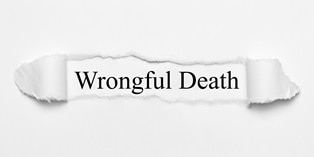
Understanding a Civil Claim in Virginia
A civil claim is a legal action brought by one person who seeks to hold another person liable for some harmful act. In a wrongful death claim, the surviving family members file a suit against the person responsible for the accident. The consequences in a civil case are typically monetary, and the at-fault driver must pay compensation to the victim’s family rather than face jail time.
Why You Should File a Wrongful Death Claim in Civil Court
While the at-fault driver may already be facing charges in criminal court, a civil action can be significant for surviving family members for a few reasons. First, the burden of proof is not as great in a civil case. Rather than having to prove the at-fault driver is guilty “beyond reasonable doubt,” guilt simply needs to be shown “by a preponderance of evidence.” This means, the defendant is more likely guilty than he is not, which is a much lighter burden to prove.
Second, surviving family members can obtain compensation to help address financial costs associated to their loved one’s death. If a driver is found to be responsible for another’s death, he could be obligated to provide compensation for:
- Funeral and burial expenses
- Medical expenses incurred before the death
- Sorrow and mental anguish
- Loss of care, comfort, companionship, and guidance
- Value of lost wages that the deceased could have been reasonably expected to earn if he or she had lived
If someone you love has died as the result of another driver’s negligent behavior, it may be possible to file a wrongful death claim. These claims can provide both justice and compensation that you and other surviving family members need to pick up the pieces and begin to move forward after a sudden death. Even if you aren’t sure if you have a claim, our legal team can explain your rights and answer your questions. Call our Fairfax office, or take a moment to fill out the contact form on this page to arrange a free case review today.
|
Related links: |
 Any time a loved one dies, families are faced with a distressing and emotional grieving process. To learn that your loved one was lost because of the careless action of another person can make that time even more difficult. Families often want answers, and they want to hold that person accountable. To that end, state law allows surviving family members to file a civil claim against those who caused the death.
Any time a loved one dies, families are faced with a distressing and emotional grieving process. To learn that your loved one was lost because of the careless action of another person can make that time even more difficult. Families often want answers, and they want to hold that person accountable. To that end, state law allows surviving family members to file a civil claim against those who caused the death.
What Is a Wrongful Death Claim?
A wrongful death occurs, according to the state of Virginia, when a person dies “by the wrongful act, neglect, or default of any person or corporation.” The claim itself is, in effect, the personal injury claim that the deceased would have been able to pursue had they survived their injuries. Simply, their family members are acting on their behalf. The most common types of wrongful death cases include those involving car accidents, medical malpractice, and defective products.
What Constitutes a Wrongful Death Case in Virginia?
To successfully pursue a wrongful death claim, surviving family members must prove certain facts in court. These include:
- The responsible party owed the deceased a duty of care. This means that he had an obligation to behave in a safe and appropriate manner.
- The responsible party breached that duty. He failed to adhere to rules and law, acting in a careless or negligent manner.
- The responsible party’s action caused the death. Not only must it be shown that the person failed to uphold their duty of care, but that failure must have led directly to the death.
The Impact of a Wrongful Death Claim
Considering a legal claim after the death of a loved one can seem overwhelming. These claims are important, though, for both surviving family members and all those in Virginia. For a family member, awards for damages can provide vital compensation that is necessary to address the changing needs and new challenges brought about by the loved one’s death. Additionally, a judgment against those responsible sends a clear message about the consequences of disregarding the safety of the community. It may prevent that same offender from further poor behavior and discourage others from acting in a similar unsafe manner, potentially saving lives in the future.
If your loved one has died in an accident, a wrongful death claim may bring your family the peace of mind and compensation you need to begin to move forward. Speak with the experienced legal team at Kearney, Freeman, Fogarty & Joshi, PLLC to learn how we may be able to help during this difficult time.
Health insurance is expensive. If both spouses have their own insurance plans, health insurance coverage isn’t typically an issue during a divorce.
However, both spouses may have health insurance from one spouse’s employer. In this situation, a divorcing couple must decide what will happen to their health insurance when the divorce is final. 
Health Insurance While Divorce Is Pending
Until your divorce is final, your health insurance coverage should continue as it was before filing for divorce. Whether you are the spouse who petitioned the court to end the marriage or the spouse responding to the divorce complaint, your health insurance should remain unchanged.
Virginia law specifically provides this protection to both spouses by allowing the court to order the continuation of health insurance coverage while divorce proceedings are pending. Therefore, if a spouse tries to end health insurance coverage for the other spouse before the divorce is finalized, and the insured spouse objects to the end of that coverage, the court may order health insurance to continue.
Health Insurance After Divorce
Health insurance coverage for a spouse should continue during a divorce, but it will not continue unchanged after a divorce. Health insurance companies allow spouses to cover family members on their health insurance policies, but once you are divorced, you are no longer legally related, and your ex-spouse cannot include you on a health insurance policy.
After the divorce, your health insurance coverage options may include getting:
- Health insurance through your own employer. A divorce is a triggering event that allows you to sign up for health insurance outside of your open enrollment period.
- COBRA coverage for a period of up to 36 months. You must notify the administrator of your ex-spouse’s health insurance plan of your decision to use COBRA within 60 days of your divorce.
- Private health insurance. Private insurance can be very expensive. While your ex-spouse may not have to pay your health insurance premiums, the cost should be considered when determining spousal support.
If you have children, their health insurance coverage should be part of your child support agreement. Additional options may be available for military families.
Contact KFFJ Law
Don’t get caught by surprise with substantial health insurance costs after a divorce. Instead, make sure your health insurance needs are considered in your Virginia divorce agreement. Please read our free article for more tips on planning for divorce, or contact us today to get your questions answered.
|
Related links: |
Your spouse’s lack of cooperation does not mean the charges against you will be dropped. You may still face severe penalties if you’re convicted, so you should still take these charges seriously. It is the government, not your spouse, that has authority to bring criminal charges against you and will decide whether to proceed with a criminal case or drop the charges. 
Domestic Assault Evidence
To be convicted of domestic assault, the government must prove its case against you beyond a reasonable doubt. Often, this includes using your spouse’s testimony. However, some assault victims recant their accusations and statements to the police because they fear future retaliation from the abuser or out of a sense of guilt. Even if your spouse recants her statements or refuses to provide testimony, the government may build its case by providing evidence, including:
- Police reports
- Medical records
- Photographs of injuries
- 911 recordings
- Social media posts by you, your spouse, or others
- Witness testimony if others were present at the time of the suspected assault
It’s likely that your spouse has valuable testimony about the abusive incident or ongoing domestic violence that the Commonwealth of Virginia wants to use in the case against you. If your spouse refuses to cooperate, the Commonwealth may lose powerful testimony, but it may still win its case.
Talk to a Criminal Defense Lawyer About Your Rights
If your spouse recants her testimony or refuses to cooperate with the government, it is still important that you to take domestic violence charges seriously and talk to a Fairfax criminal defense lawyer as soon as possible.
If you are convicted of domestic assault in Virginia, you could spend time in jail, pay a significant fine, lose any job-related security clearance, and possibly lose your job. Contact the criminal defense lawyers of Kearney, Freeman, Fogarty & Joshi to learn more about your rights and to make sure your rights are protected.
|
Related links: |
Boat accidents are like other types of Virginia vehicle crashes. If you can prove that someone else’s negligence caused your accident injuries, you can recover damages. 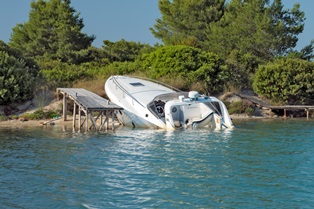
Boat Accident Negligence
If you were hurt in a boating accident that wasn’t your fault, you need to show that the at-fault party was negligent. You must establish that:
- The person who caused the boat accident owed you a duty of care. Boat operators and owners owe their passengers and others on the water a duty of care.
- The person who caused the boat accident breached the duty of care. Boat operators and owners who fail to act like other reasonable boat operators and owners would act in similar circumstances breach their duty of care.
- You were hurt because of the breach of the duty of care. You need to prove that the at-fault party’s negligence was a primary factor in causing your injuries, and your injuries would not have happened but for the boat operator’s or owner’s breach of the duty of care.
Some examples of negligence in boat accident cases include boating while intoxicated, distracted boating, failing to keep a proper lookout, and any other situation where a boat operator or owner fails to use reasonable care.
Boat Accident Damages
Once you establish that someone else’s negligence caused your boat accident injuries, you need to prove the value of your injury. Your boat accident lawyer will consider all of your damages, including:
- Healthcare costs. All of your past, present, and future medical expenses related to the accident can be recovered—hospitalizations, surgeries, medications, doctor visits, and physical therapy appointments.
- Lost income. Lost wages, lost benefits, and any income from self-employment that you could not earn due to your injuries should be included in your recovery.
- Physical pain and emotional suffering. These may be your most significant damages, but they may also be the hardest to quantify. An experienced Virginia injury lawyer can look at all of the facts of your case and prove the value of these damages.
- Other costs. Any additional expenses that you prove are directly related to your boat accident injuries should be part of your financial recovery.
If you’re injured on a Virginia waterway, you have the right to recover damages. Protect that right by contacting a boat accident lawyer today for a free, no-obligation consultation. You can reach us by phone, through an online chat, or by filling out our contact form.
|
Related links: |
Substance abuse may be relevant to some aspects of your divorce agreement or court decree. Therefore, you should share your spouse’s substance abuse problem with your divorce lawyer as soon as possible. 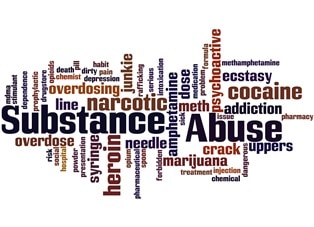
Substance Abuse as Grounds for Divorce
Substance abuse is not listed as a statutory reason for an at-fault divorce in Virginia. However, if substance abuse leads to a felony conviction, puts you at risk for physical harm, or causes your spouse to desert you, it could be a reason for a fault-based divorce. Otherwise, substance abuse may be the reason that you seek a no-fault divorce.
Since you can seek a no-fault divorce in Virginia, grounds for divorce may not be your primary concern. Instead, you may be worried about the details of your divorce.
How Substance Abuse Impacts a Divorce
In most cases, your spouse’s alcohol or drug addiction will not affect alimony, division of marital property, or division of marital debt. However, if your spouse spent a significant portion of your family money on drugs or alcohol or incurred debt because of his addiction, it could impact alimony and the division of marital assets and debts.
Substance abuse is more likely to impact child custody and visitation. The courts decide child custody issues based on the best interests of the child and not what is equitable for the divorcing spouses. Therefore, if you can prove that it is not in your child’s best interests to spend time with a parent who abuses drugs or alcohol, you may be able to prevent your child from spending unsupervised time with the parent who is not always sober.
If you’re worried about your children’s safety due to your spouse’s substance abuse, our experienced family law attorneys will help you obtain a fair and legal divorce settlement that protects your kids. To learn more, please fill out our online contact form, or call us today.
|
Related links: |
In Virginia, a person under the age of 18 cannot consent to sexual activity, and the penalties for someone who violates the law and has sex with an underage child can be significant. However, there are exceptions to the law, and sexual activity with a teenager is not always a crime. 
Virginia Statutory Rape Laws
Several different statutes apply to what is commonly called statutory rape, including:
- Having sexual intercourse with a child who is under the age of 13 is rape, according to Va. Code § 18.2-61
- Having sexual intercourse, oral sex, anal sex, or sexual penetration with an object with a child between the ages of 13 and 15 is a crime, according to Va. Code § 18.2-63
Sexual abuse, incest, exposing oneself to a child, and suggesting an illegal sexual act to a child are also against the law in Virginia.
Defenses to Virginia Statutory Rape Laws
A potential defense depends on the unique circumstances of an individual case. However, some defenses include:
- The ‘Romeo and Juliet’ exception. This exception is used when there is consensual sex between minors who are less than three years apart in age. For example, teens between the ages of 13-15 or 15-17 could have consensual sex, and the penalty is reduced from a felony to a misdemeanor.
- The ‘Marital’ exemption. This allows consensual sex between a minor, 15 years or older, who is married to someone over 18.
Don’t Leave Your Defense to Chance
If you’ve been charged with statutory rape, you may believe you’re morally and ethically innocent. However, if convicted, you face a potentially significant sentence that includes between one year and life in prison and a fine of $2,500 – $100,000. Additionally, you will be required to register as a sex offender. Contact our criminal defense lawyers today to learn more about your rights and what you need to do to protect yourself.
|
Related links: |
Punitive damages, or damages that are meant to punish the defendant rather than compensate the plaintiff, are allowed in Virginia personal injury cases. However, punitive damages are only allowed in specific situations, and they can be very difficult to obtain. 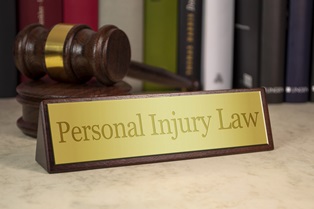
Punitive Damages for Egregious Behavior
Although you may have suffered a very serious injury or your loved one may have been killed in an accident, this doesn’t mean you’ll automatically recover punitive damages. Instead, if you are pursuing a punitive damage award, the court will consider the defendant’s behavior that resulted in your injury.
Punitive damages may be awarded to you if you can prove that the defendant acted with either malice or with willful and wanton disregard for the rights of others. Punitive damages are awarded in addition to compensatory damages. If the defendant’s conduct is not malicious, willful, or wanton, but the defendant failed to use reasonable care, and that resulted in your injury, you may still be able to recover compensatory damages for medical expenses, lost income, and pain and suffering.
Punitive Damage Limits in Virginia
The purpose of punitive damages is to punish the defendant, and this financial support will provide you with compensation over and above the value of your compensatory damages. As with other kinds of damages, you will need to prove the value of the punitive damages you are seeking by providing convincing evidence to the court.
While the exact value of your potential punitive damage award is dependent on the facts of your case and the arguments you make, Virginia law limits the amount of punitive damages to a maximum of $350,000.
Talk to a Personal Injury Lawyer About Punitive Damages
Punitive damages are not awarded in every case. Our experienced Virginia personal injury lawyers will review the facts of your case and provide you with our professional opinion about whether or not you should pursue punitive damages. Call us, or start a live chat to schedule a free, no-obligation consultation to discuss your rights and all of your potential compensation.
|
Related links: |
In Virginia, a pet is considered personal property. Therefore, unlike child custody which may be shared, a pet will be awarded to one spouse if the court must get involved and make the decision for you. 
What the Court Considers When Deciding Pet Custody
If you and your soon to be ex-spouse can’t decide who should have the pet after the divorce, the court will decide. Often the court will consider factors, such as:
- Who is home more often
- Who the pet is most attached to
- Who brings the pet to the vet or groomer
- Who feeds, walks, and plays with the pet
- Who owned the pet prior to marriage (if applicable)
The court may also consider whether one spouse neglected or abused the pet.
Should Pets Be Personal Property?
Because both spouses may share in the care of a pet, some states are considering other ways to assign pet ownership after a divorce and may no longer treat pets as personal property. However, this is not yet the case in the Commonwealth of Virginia. Pets are personal property, and you should be prepared to fight for ownership of your pet if you want the pet to live with you after a divorce.
Talk to Your Divorce Lawyer About Pet Ownership
If keeping your pet is a priority for you, it is important to let your lawyer know. He can work hard to help you keep your pet, as well as help you divide the rest of your property fairly. Contact us today via this website or by phone to learn more.
|
Related links: |
If you need a criminal defense attorney, the person you hire could play a pivotal role in whether you go to jail, pay significant fines, or face other legal penalties. 
What to Look for in a Criminal Defense Attorney
As you consider different attorneys to represent you in your criminal case, it is important to think about:
- Whether the lawyer has experience in the local court system
- Whether the lawyer will explain all of your options to you, so you can make informed decisions
- Whether the lawyer has trial experience and can/will participate in plea bargaining
- Whether the lawyer will be available and willing to answer questions as your case progresses
- Whether the lawyer will represent you if you need to appeal
When you’re making a decision about legal representation, it is often a mistake to hire a lawyer who does not specialize in criminal law. You may have a used a great attorney for a real estate closing or to draft your will, but if you have been charged with a crime, you need a criminal defense lawyer to represent you.
Questions to Ask Before Hiring a Criminal Defense Lawyer
When you’re looking for a criminal defense attorney, it’s important to schedule an initial meeting before you hire anyone. At that meeting, you can get to know the lawyer and how he can help you. You may consider asking questions, including:
- How long have you been practicing criminal defense law?
- How often do you appear in the court where my case will be heard?
- How frequently do you go to trial? How many of your cases end in plea bargains?
- Have you ever handled a case similar to mine before?
- What are my legal options?
- Do you see any potential problems with my defense?
- Who else at the firm will be working on my case?
- Can I call you if I have any questions about my case?
- How are you paid?
If you would like to schedule your first appointment with the experienced Northern Virginia criminal defense lawyers at Kearney, Freeman, Fogarty & Joshi, PLLC, please call us, or fill out our online contact form today.
|
Related links: |
If a dog bit you, it may result in an infection. Symptoms of an infection may include redness, swelling, fever, or discharge from the wound site. After any dog bite, it’s important to get immediate medical care, as a proper diagnosis and treatment plan are necessary to prevent further illness and, in some cases, death. 
Types of Dog Bite Infections
An infection may develop because the dog bite broke your skin and exposed you to bacteria. Some specific infections caused by a dog bite include:
- Staph
- Strep
- Capnocytophaga
- Pasteurellosis
- Cellulitis
- Rabies
Consult a Northern Virginia Dog Bite Lawyer
If you’ve been hurt by someone else’s dog, you may be entitled to financial damages for all of the injuries you’ve suffered. Our Fairfax dog bite lawyers will work hard to help you recover for all of your past, current, and future expenses related to your injuries, which may include but are not limited to:
- Hospitalizations
- Surgeries
- Doctor appointments
- Medications
- Rehabilitation therapies
- Lost income
- Out-of-pocket costs
- Physical pain
- Emotional suffering
Together, the attorneys of Kearney, Freeman, Fogarty & Joshi, PLLC have more than 100 years of legal experience. We apply this experience and our passion for justice to every client we represent. To find out more about your rights and potential recovery, please contact our Fairfax dog bite law firm today for a free, no-obligation consultation.
|
Related links: |
Most people take for granted that their state has understandable, reasonable laws that everyone must follow. It’s against the law to steal, assault or kill another person, and drive recklessly or while intoxicated. However, the Commonwealth has some laws on the books that you may not know about. 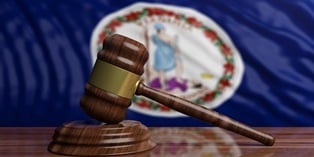
Strange Virginia Laws
As a Virginia resident, you should know that it is technically illegal to:
- Use profane, indecent, or threatening language on the phone. This includes the language you use in your text messages.
- Tickle a woman. Men, however, may be tickled.
- Hunt any animal other than a raccoon on a Sunday. If you are going to hunt a raccoon on a Sunday, however, you must do so by 2 a.m.
- Have sex with the lights on.
- Have sex outside of marriage. This is punishable as a Class 4 misdemeanor.
Additionally, different counties and municipalities have their own strange laws. For example, it is:
- Illegal to flip a coin to decide who pays for coffee in Richmond.
- Illegal to wash a mule on the sidewalk in Culpeper.
- Illegal to spit on a seagull in Norfolk.
- Illegal for a woman to be out at night in Norfolk unless she is wearing a corset and is accompanied by a male chaperon.
- Legal for a man to beat his wife on the courthouse steps in Stafford County as long as he does it before 8 p.m.
Will You Face Legal Penalties for Breaking These Laws?
Whether you can face penalties for breaking these laws depends. In 2012, for example, the Virginia Supreme Court applied the law making it illegal to use profane, indecent, or threatening language over the phone. However, there are no known recent cases where a couple having sex with the lights on was prosecuted.
|
Related links: |
Police can legally operate sobriety checkpoints in the Commonwealth of Virginia, but their right to stop and search a driver is not unlimited. Instead, the Fourth Amendment to the United States Constitution protects drivers from unreasonable search and seizure and gives drivers certain rights at sobriety checkpoints. 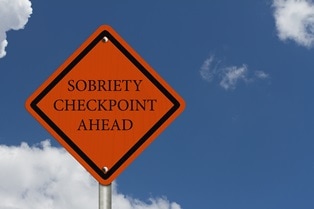
What Police Can and Cannot Do at a Sobriety Checkpoint
The police must publicize a sobriety checkpoint before operating it. This information may be found on the police department’s website and usually in the local newspaper. At this checkpoint, the police can’t do the following:
- Stop every vehicle that goes through the checkpoint. Instead, police may stop vehicles according to a predetermined pattern such as every third or fifth car. Of course, this does not prevent the police from pulling you over if they have reasonable cause to believe that you have violated the law.
- Insist that you take a BAC test or field sobriety test simply because you drove through the checkpoint. However, the police may require one or more of these tests if they reasonably believe you are intoxicated.
- Require you to answer questions about where you are traveling from or what you were doing prior to being pulled over. While you should always be polite to the police and provide your license and insurance information, you do not have to answer questions that may be self-incriminating.
While you may not be able to prevent being pulled over at a DUI checkpoint, you can control what happens after the police stop your car.
Protect Your Rights at a Virginia DUI Checkpoint
Understanding what the police can and cannot do is the first step in protecting your rights at a sobriety checkpoint. However, if you are arrested for drunk driving in Virginia, you need to take further action. You need to contact an experienced DUI defense lawyer quickly for help getting the charges against you possibly reduced or dismissed.
The criminal penalties for drunk driving in Virginia can be significant. Call us, or contact us via this website for a free, no-obligation consultation about your rights, so you can protect your future.
|
Related links: |
The court will prefer that you and your child’s other parent come to an agreement about child custody. However, if you can’t come to an agreement, the court will make a decision about child custody based on the best interests of your child, and breastfeeding may be a factor in the court’s decision. 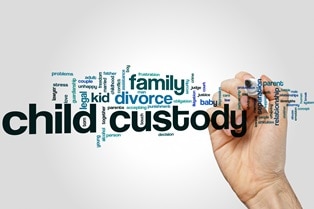
Breastfeeding May Be Considered in Child Custody Decisions
Nursing moms will not be automatically granted sole custody in Virginia. Instead, the court will consider the evidence presented by the nursing mom and the child’s other parent to determine if breastfeeding is in the best interests of the child. This evidence may include:
- The age of the child and how long the child has been breastfeeding
- Information about whether the child takes a bottle or eats solid food
- Information about how feasible it is for the nursing mom to pump and provide breast milk to the other parent for the child’s feedings
- Medical studies or expert testimony showing the importance of breastfeeding for a baby’s health
- Information about the potential impact on the child if the child is to be weaned
Modifying a Child Custody Agreement When Breastfeeding Ends
At some point, breastfeeding will end, and this will likely be seen as a material change in circumstances by the court. For that reason, a child custody agreement may be modified when a child is no longer nursing or when the non-breastfeeding parent can prove that the nursing mom is breastfeeding in order to keep the current physical custody agreement in place. In order to get the child custody agreement modified, you will need to petition the court and explain the material change in circumstances.
Whether you are creating an initial child custody agreement or are seeking to modify your current child custody agreement, it is important to work with an experienced Fairfax family law attorney who can make sure that your rights are protected. Call us, or reach out to us for an initial consultation about your rights.
|
Related links: |
Full tort coverage and limited tort coverage are car insurance options that impact how much an injured party can recover in a car accident case. Limited tort is not available in all states, but it is an option in some. It is an option that must be exercised at the time auto insurance is purchased and not at the time a crash occurs. 
Full Tort and Limited Tort Car Insurance
People with full tort car insurance can pursue full damages from a negligent driver or an insurance company after a crash. This includes damages for lost wages and pain and suffering. While injured parties must still prove the value of these damages, the amount they can recover is not limited by their insurance contract.
People who instead choose to purchase limited tort insurance pay less in insurance premiums than people with full tort coverage, but they are also paying for less insurance. If a person with limited tort insurance is hurt in a crash, that person may only recover pain and suffering damages if his injury hits a certain threshold and is classified as a serious injury.
Virginia is a Tort (Fault) Car Accident State
In Virginia, the driver who caused the crash is responsible for paying for the injuries resulting from the crash. This includes pain and suffering. While there is no exact science in determining the value of pain and suffering, insurance companies and courts may consider things such as:
- The extent of your injuries
- The medical treatment that you have received and will need in the future
- The impact the injuries have had on your daily life, your ability to work, and your family life
Auto insurance policies contain a lot of technical language that can impact your recovery of damages after a crash. If you have been hurt in an accident, the best way to ensure that your right to a fair recovery is protected is to contact an experienced Fairfax car accident lawyer. Our attorneys are here to help you. We would be pleased to offer you a free, no-obligation consultation, so you can learn more about your rights and potential compensation. Please call us, or reach out to us today via this website to learn more.
|
Related links: |
Virginia law allows you to change your name during your marriage, during divorce proceedings, or after your divorce. You do not need your spouse’s consent if you decide to change your name. The decision is yours to make. 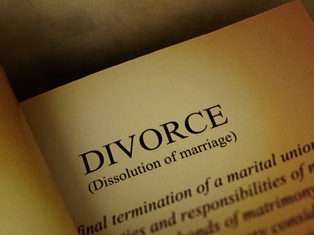
Requesting a Name Change While a Divorce Is Pending
If your divorce has not yet been finalized, you can still request that the court legally change your name as part of your divorce proceedings. You do need to file a separate application for a name change. However, your name change request must be included in your initial divorce pleadings or orally during your final divorce hearing. The court may only change your name back to a name you had prior to marriage if you seek the name change during divorce proceedings.
How to Request a Name Change
If your divorce case is not currently active and you are not about to initiate a divorce action, you will need to file a separate application with the court in order to have your name legally changed. This action must be filed in the circuit court of the city or county where you live. The filing must be accompanied with the required fee.
Important Documentation for a Virginia Name Change
When you request a name change, the court will to want to see certain documentation, including:
- A Virginia Application for Name Change. The application will ask for basic information such as your current name, your current address, your parents’ names, whether you have ever been convicted of a felony, and any previous names you have had. The application must be witnessed by a notary public or a clerk of the court.
- Your Birth Certificate. This will provide proof of your maiden name.
- Your Marriage Certificate. This will provide proof of your married name.
- Your Divorce Decree (if one has already been issued). This will provide the court with a non-fraudulent reason why you want to change your name.
If all of your paperwork is in order, your name change should be granted by the court. Once the court grants your name change request, you will need to take steps to change your name with:
- The Department of Motor Vehicles (DMV)
- The Internal Revenue Service (IRS)
- The Social Security Administration (SSA)
- Your banks
- Your credit card companies
- Your retirement and investment accounts
- Your insurance companies
- Your utility companies
- Your employer
- Your kids’ schools
Changing your name because of a divorce may be one of the easier aspects of the divorce process. However, if you have any questions about changing your name or any other issues concerning your divorce, please contact our experienced Fairfax family law attorneys today for an initial consultation.
|
Related links: |
In Virginia, aggressive driving is not the same thing as reckless driving or road rage. Instead, aggressive driving is a specific criminal misdemeanor. In order to be convicted of aggressive driving, you must have violated the aggressive driving statute. 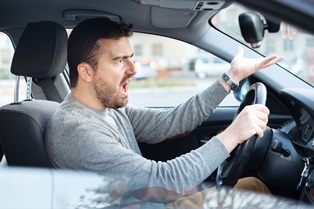
Aggressive Driving Is Defined in Section 46.2-868.1 of the Virginia Code
According to Section 46.2-868.1 a driver is guilty of aggressive driving if:
- He failed to drive on the right side of the highway (§46.2-802)
- He failed to observe lanes marked for traffic (§46.2-804)
- He was following another vehicle too closely (§46.2-816)
- He failed to stop or yield the right-of-way before entering a highway (§46.2-821)
- He evaded traffic controls (§46.2-833.1)
- He failed to abide by the laws for passing when overtaking a vehicle (§46.2-838)
- He failed to give way to an overtaking vehicle (§46.2-842)
- He failed to give way to certain overtaking vehicles on divided highways (§46.2-842.1)
- He failed to obey certain limitations on overtaking and passing a vehicle (§46.2-843)
- He failed to obey maximum speed limits on highways and roads (§46.2-870)
- He stopped on the highway (§46.2-888)
In addition to violating one of these laws, a driver must have presented a hazard to another person or committed the violation of the law with the intent to harass, intimidate, injure, or obstruct another driver.
Criminal Penalties for Aggressive Driving
In most cases, violating the aggressive driving statute is a Class 2 misdemeanor. In Virginia, a Class 2 misdemeanor is punishable by jail time of not more than six months and a fine of not more than $1,000.
However, if the driver acted with the intent to injure another person, violating the aggressive driving statute may be considered a Class 1 misdemeanor. The potential consequences of a Class 1 misdemeanor are more significant than those of a Class 2 misdemeanor. If you are convicted of a Class 1 misdemeanor, you face jail time of up to 12 months and a fine of not more than $2,500.
If You’ve Been Charged With Aggressive Driving
If you have been charged with aggressive driving, you not only face jail time and a fine, but you also face a criminal conviction that will be on your permanent record. This could impact your future.
Remember that an aggressive driving charge is not a simple traffic ticket. Instead, you have been charged with a crime. Therefore, it is important to take this criminal charge seriously and to contact Kearney, Freeman, Fogarty & Joshi as soon as possible. Our lawyers will make sure all of your rights are protected from the time you contact us until your case is resolved.
Related links:
Virginia, unlike many other states, does not recognize “separation” as a legal status in a no-fault divorce. Therefore, there is no special designation that you need from the court in order to be legally separated before you seek a divorce. 
You Still Need Proof That You Were Separated
In order to get a no-fault divorce in Virginia, you must either be separated from your spouse for one year or, if you have no minor children, be separated from your spouse for six months with a separation agreement in place.
Without a formal separation designation from a court, you will need to prove the date which you separated. Generally, Virginia courts consider the date of separation to be the date on which one of the spouses decided that the marriage was over and informed the other spouse of that decision. This may have been done through a conversation or in writing (typically, via email or text).
If the date of separation is in dispute, the court may consider things such as:
- Whether there is a voluntary settlement agreement that is dated and signed
- When you and your spouse began to identify yourselves as separated to family and friends
- Whether you continue to attend events or go out together
- Whether you live in the same house and, if you do, whether you share a bedroom
If there are grounds for divorce such as adultery, desertion, or cruelty, there are legal options that are not used in a no-fault divorce case. For example, either spouse may request temporary relief from the court to resolve immediate issues of child custody, spousal support, and use of the marital home. Additionally, a spouse may file for a limited divorce—known as a divorce from bed and board. If a divorce from bed and board is granted, neither party may remarry or legally engage in sexual relations with anyone else.
Voluntary Separation Agreements
While Virginia law does not typically require separation agreements, the spouses may choose to negotiate a separation agreement that resolves issues such as child custody, child visitation, spousal support, use of marital property, and property division pending a final divorce.
If you are interested in entering a voluntary separation agreement or establishing a clear date of separation from your spouse, it is important to contact an experienced divorce lawyer as soon as possible. Our lawyers understand that the decisions you make now will significantly affect you and your family. We will always listen to your concerns, provide you with honest advice, and help you make a realistic plan to achieve your goals. Contact us today.
|
Related links: |
Prescription drugs are legal drugs that the Food and Drug Administration (FDA) have approved for doctors to prescribe to patients in certain circumstances. For example, these types of drugs may cure an infection, control pain, or treat a chronic illness, and they help millions of people every day.
However, prescription drugs are also controlled substances, and it’s a violation of Virginia law to use prescription drugs in certain ways. 
Prescription Drug Abuse Is a Problem in Virginia
According to the Virginia Office of the Attorney General, some prescription drugs that are often abused include:
- Painkillers such as OxyContin, Percocet, and Demerol
- Depressants such as Valium, Xanax, and Ambien
- Stimulants such as Ritalin, Dexedrine, and Adderall
The Three Major Prescription Drug Crimes in Virginia
In Virginia, it is against the law to do any of the following with a prescription drug unless you are specifically authorized to do so by the government:
- Manufacture a prescription drug
- Sell, give away, or distribute a prescription drug
- Possess a prescription drug with the intent to manufacture, sell, give away, or distribute the drug
Depending on the specific circumstances of your case, you may be charged with a misdemeanor or a felony, and you may face significant fines and jail time. Relevant circumstances may include how the drug is classified according to the Virginia Drug Control Act, your age, the age of the other people involved in the incident, and other factors.
Get Help If You’ve Been Charged With a Crime
Don’t let the word “prescription” confuse you. Legally, a prescription drug can only be used by the person it was prescribed to. If you’ve been charged with a prescription drug crime, you need an experienced Virginia drug defense lawyer to help you.
The Law Firm of Kearney, Freeman, Fogarty & Joshi will review your case carefully and help you make informed decisions if you are facing prescription drug crime charges. To learn more about your defense, please contact us to schedule a free initial consultation.
|
Related links: |
The answer is yes. According to study commissioned by the Insurance Institute for Highway Safety (IIHS), red light cameras have reduced fatal intersection accidents by 21%, and red light cameras have reduced all intersection accidents by 14%. 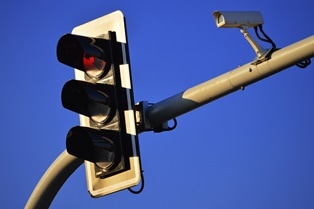
How Red Light Cameras Are Used in Virginia
In 2007, the Virginia General Assembly approved the use of red light cameras at Virginia intersections, and in 2009, Virginia Beach became the first city in the commonwealth to use this technology. Over the past decade, the use of red light cameras has expanded to other Virginia towns and cities.
Red light cameras are attached to traffic signals and sensors. If a vehicle enters an intersection after the light turns red and the mandatory grace period of at least one half a second has passed, a series of pictures or a video may be taken by the camera. This information is then reviewed by law enforcement officials. If a police officer determines that the driver of the vehicle violated the law by running a red light, a ticket will be mailed to the owner of the vehicle, if appropriate.
Contact Kearney, Freeman, Fogarty & Joshi
If you’ve been hurt in a Virginia intersection crash, it is important to contact an experienced car accident lawyer for help. Your attorney will consider all of the evidence related to the accident, including any footage from a red light camera, and advise you of your rights and potential recovery. To learn more, please contact us today via this website or by phone to schedule your free, no-obligation initial consultation.
|
Related links: |
If the state has suspended your license, you’re not allowed to drive unless you have a restricted license that allows you to drive to and from specific locations such as work, school, and medical appointments. 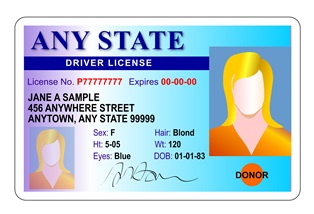
Penalties for Driving With a Suspended License in Northern VA
Virginia law classifies driving on a suspended license as a criminal misdemeanor. The potential legal penalties depend on how many times you’ve been caught driving with a suspended license. Specifically, you may face:
- Up to 12 months in jail, up to $2,500 in fines, and an additional suspension of your license for your first or second offense.
- A mandatory minimum 10-day jail sentence plus up to 12 months in jail, up to $2,500 in fines, and an additional suspension of your license for your third or more offense.
How a Lawyer Can Help in A Criminal Case
To be convicted of driving on a suspended license, the Commonwealth of Virginia must prove that you were driving a motor vehicle on a public road, that your license had been suspended, and that you knew that your license was suspended when you were driving. If the prosecutor cannot prove one or more of these elements, you cannot be convicted. An experienced lawyer can help determine whether you have a defense that could be successful in court.
However, our experienced lawyers may be able to help you even before you are charged with a misdemeanor. If you believe that your Virginia driver’s license was wrongfully suspended, we may be able to help you get your license reinstated. Likewise, if you believe your license is about to be wrongfully suspended, we may be able to help you before that happens.
Not being able to drive can have a significant impact on your life, on your ability to work, and on your ability to take care of your family. However, it is important that you don’t make matters worse by driving on a suspended license. For more information about how to protect your rights, please contact our experienced defense lawyers now by calling 877.652.1553.
|
Related links: |
Technology has certainly changed since Google Maps debuted on February 8, 2005. Today, Google obtains some of its information about traffic and car accidents from people who don’t know they’re providing it and from others who want to share it. 
Three Ways Google Maps Gets the Info it Needs
Google can’t get the information it needs to report on traffic and car accidents without help from others. Specifically, Google Maps gets its information about road conditions from:
- Crowdsourcing. People are encouraged to report traffic conditions through Waze, and that information is included in the traffic condition data reported back by Google Maps.
- Local highway authorities. Local highway authorities may have road sensors or cameras and may share that information with Google.
- Information from your phone you may not know you’re sending. If you have location services turned on in your phone settings, you may be transferring information about traffic conditions to Google without even knowing it. Google analyzes how fast you are moving while the Google Maps app is open and uses that as part of its traffic condition analysis.
Google Maps provides many benefits to users who are traveling to a new location or who are stuck in traffic. The app may tell them how to bypass traffic, which lane to be in to ensure getting off at the right exit, and the length of time for certain slow-down points.
Google Maps may be a helpful tool for you and other drivers, but as with any map or GPS, it’s important to not become distracted when using it and to keep your eyes first on the road.
If you have been in a car accident, please contact Kearney, Freeman, Fogarty & Joshi today by sending us a message or calling 877.652.1553.
|
Related links: |
If your car accident injury will require medical treatment that extends after your accident case resolves, you need to include the costs of future medical treatment in your settlement (or court verdict). Otherwise, you will bear all of the financial responsibility for your future medical costs. 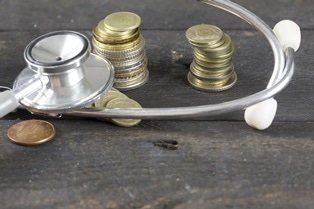
Valuing Expenses in the Future
Determining future medical costs for your injury can be difficult to do, but a personal injury attorney can help you do this accurately. In order to value medical expenses for future treatment, it is important to have:
- An accurate diagnosis and treatment plan. This should include all of your accident injury reports and all of the medical care you are likely to need.
- An expert witness. This type of witness can testify as to what your future medical needs are likely to be and what they may cost in the future. These witnesses can include doctors and healthcare economists.
- An experienced attorney. You need to hire an attorney who can analyze the financial data and make convincing arguments to the insurance company or to the court about future medical costs, so you are awarded fair compensation for your injuries.
You Have Just Once Chance to Make a Fair Recovery
Once you accept a settlement or your case is decided in court, your case will be over. You will not be able to seek additional damages from the defendant in the future. Accordingly, you need to properly value your future medical costs while your case is pending. This includes damages for all of your future doctor visits, hospitalizations, surgeries, medications, rehabilitation therapies, and other medical costs related to your car accident injuries.
To learn more about your potential recovery for future medical expenses, please contact us today to schedule your initial consultation with an experienced car accident lawyer.
|
Related links: |
Yes. It may appear that the other driver was at fault for the accident and for your resulting injuries. However, car accident liability is not always clear, and car accident damages can be complicated. 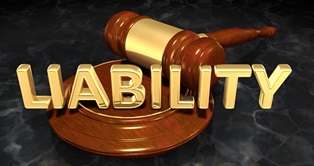
How an Attorney Can Help
Even if you feel the other driver was definitely at fault for your car accident and injuries, a personal injury attorney can help you by:
- Gathering evidence to establish liability. You may know that the other car ran the red light, but that is not enough to convince the insurance company or the court to provide you with fair compensation. Instead, you need evidence that proves liability.
- Being prepared if you are accused of being at fault. In Virginia, you may be unable to recover damages if you bear any responsibility for the accident. For example, if you were distracted at the time of the crash and are found to be partially at fault, you will be unable to recover damages even if the other driver ran a red light.
- Establishing the value of your damages. The other driver may be clearly at fault for the crash, but his lawyers may dispute how badly you were injured in the crash and the value of your damages. An experienced lawyer can review your medical records and gather the required evidence to prove how badly you were hurt and what you should recover for past, current, and future medical expenses, lost income, out-of-pocket costs, and pain and suffering.
Don’t Hesitate to Call an Attorney
Not only can your attorney help maximize your damages, he will deal with insurance adjusters, file court papers, and negotiate your settlement while you concentrate on your physical recovery and moving forward with your life.
We would be pleased to provide you with a free, no-obligation consultation if you have been hurt in a crash caused by a driver who ran a red light. Please call us, or contact us via this website today to learn more.
|
Related links: |
Before you can recover any damages in a settlement or in court, you have to do two things. First, you must prove that the defendant is legally responsible for the truck accident injuries you’ve suffered. Second, you must prove the value of the damages you’ve already incurred and those you may incur in the future. 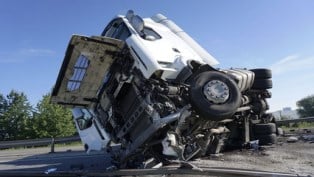
Damages That Should be Included in Your Recovery
When you file a personal injury claim after a truck accident, you may be able to recover compensation for all of the following damages related to your injury:
- Medical expenses. These include surgeries, hospitalizations, doctor appointments, medical tests, medications, and rehabilitation therapies.
- Lost income. Any income you cannot earn because of your injuries should be part of your recovery. This includes partial or total loss of income, bonuses, and other compensation received from an employer or income from self-employment.
- Out-of-pocket costs. Any expenses you incur as a direct result of the truck wreck may be compensated.
- Pain and suffering. You should be compensated for your physical pain and emotional suffering. Mental anguish, scarring, physical disfigurements, and disabilities will be considered.
Additionally, you may be able to recover compensation for your property damage and for anything else you can prove that you lost as a direct result of your truck accident. In limited circumstances, punitive damages are also possible.
How to Protect Your Fair Recovery
If you’ve suffered injuries due to a truck driver’s negligence, you have the right to recover damages, and you need an experienced lawyer to protect your rights.
Our lawyers know how to investigate your case, gather evidence, and argue for a fair recovery. Don’t take unnecessary chances with your financial future. Contact us our Fairfax, Virginia experienced personal injury attorneys for a confidential consultation about your rights and potential recovery.
|
Related links: |
The trauma of a car crash can result in a serious eye injury. As with any type of car accident injury, you will need to prove what injury you suffered, why it happened, and who is legally responsible for it in order to recover damages. 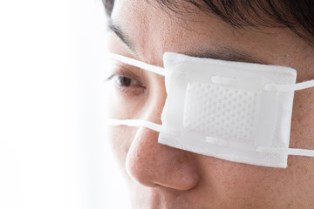
Car Crashes and Eye Injuries
There are a variety of eye injuries you can sustain after a car crash. These injuries include:
- Lacerations. If the crash causes an object to scratch or punctures your eye, your vision may be impacted.
- Orbital fractures. Broken bones around your eye could impact your vision.
- Corneal abrasions. A scratch or abrasion of the cornea could impact your vision.
- Retinal detachments or tears. The force of the car crash can cause this serious type of eye injury.
- Chemical burn. If the powder from the airbag enters your eye, your vision could be affected by a chemical burn.
- Traumatic brain injury. Your vision may be impacted if certain areas of the brain are hurt.
Kearney, Freeman, Fogarty & Joshi Can Help Personal Injury Cases
Once the cause of a crash and the responsible parties are identified, you may decide to take legal action to recover damages for your eye injury. Through a settlement or court case, you may be able to recover compensation for your medical expenses, lost income, out of pocket costs, pain, suffering, and other damages.
Let us help you get the fair recovery you deserve if your vision has been damaged or lost after an accident. Contact us today to schedule a free, no-obligation consultation with an experienced car accident lawyer at your convenience.
|
Related links: |
Yes, you can still seek compensation if you were injured while you weren’t wearing a motorcycle helmet. However, proving that you aren’t partially at fault for your injuries may be very difficult. The state of Virginia mandates helmet use because a helmet is the most important piece of safety equipment available to motorcycle riders. According to the Virginia Department of Motor Vehicles, helmets are about 29 percent effective in avoiding motorcycle fatalities and approximately 67 percent effective in preventing brain injuries. Failure to wear a helmet means that a motorcycle rider is 40 percent more likely to sustain a lethal head injury. 
Virginia Motorcycle Helmet Laws
According to Virginia Code 46.2-910, motorcycle operators and passengers are required to wear a helmet whenever the bike is in motion. The helmet must meet or exceed the specifications of the Snell Memorial Foundation, the American National Standards Institute, or the Federal Department of Transportation. Virginia also mandates that motorcycle operators wear a face shield, safety glasses, or goggles, or they must ride a bike equipped with safety glass or a windshield.
Mitigation of Damages
Some defense attorneys may attempt to argue that failure to wear a helmet is a form of contributory negligence. Virginia’s contributory negligence rules bar plaintiffs from recovery when their own behavior contributed to the accident. This means, if you are found partially responsible for your motorcycle accident, you may be denied compensation for your injuries. However, Virginia’s motorcycle helmet statute clearly states that simply failing to wear a helmet does not constitute proof of negligence.
Every vehicle operator in Virginia has a legal duty to mitigate damages. Not wearing a motorcycle helmet may be seen as a failure to mitigate damages, since a helmet can significantly decrease the severity of head injuries. If a plaintiff failed to wear a helmet and suffered head injuries in a motorcycle accident, the defense may successfully argue that the lack of a helmet led to those injuries. This could result in damages being reduced or even eliminated entirely.
Recovery for Injuries
While it is true that failure to wear a helmet can impact your ability to recover damages, this is only the case in those instances where a helmet would have significantly reduced the probability of injury. A severe impact can overcome the protection offered by any helmet, resulting in severe head injuries. If it can be proven that you would have sustained head injuries while wearing a helmet, you may still be entitled to compensation.
Furthermore, if you did not sustain head or neck injuries, failure to wear a helmet is legally irrelevant. This is true even though Virginia law requires you to wear one. You will still be entitled to compensation for any other injuries you’ve sustained, including:
- Biker’s arm. Biker’s arm occurs when a motorcycle rider is thrown in an accident, and his arm gets the force of the impact as he braces against the fall.
- Leg injuries. Leg, knee, and foot cuts and fractures are common in a motorcycle accident.
- Internal injuries. When the body is hit with enough force, internal organs may be damaged, which may also result in dangerous internal bleeding.
- Road rash. Serious abrasions can occur when a rider is thrown from his motorcycle and slides across the pavement.
- Broken bones. Hitting the ground hard or at the wrong angle can easily cause bones to break, and broken bones are very common in motorcycle accidents.
- Muscle damage. Muscles may be injured anywhere on the body.
- Spinal cord injuries. If the rider lands on his back, or if an object pierces his spinal cord, he may suffer serious spinal cord injuries.
You Need an Attorney
If you’ve been injured in a motorcycle accident, it’s important that you hire an experienced personal injury attorney. When you’ve been injured while not wearing a helmet, you especially need a lawyer’s expertise and guidance in the pursuit of your claim. To learn more, contact the vehicle accident attorneys of Kearney, Freeman, Fogarty & Joshi, PLLC by using the form on this page.
|
Related links: |
If you’re involved in a car accident in Virginia, the law requires that you stop and give contact information to the other person involved. However, not all drivers follow the rules and stay at the scene. If you’re involved in a crash, and the at-fault driver leaves the scene of the accident, it’s important you know your next steps. 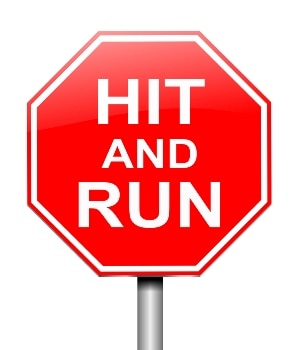
Your First Steps After a Hit-and-Run
In general, a hit-and-run occurs when someone is involved in a car accident—whether it’s with another car, a pedestrian, or a fixed object—and then that person leaves the scene without giving aid to an injured party or identifying himself. In some states, a hit-and-run can include an accident with an animal.
The Insurance Information Institute (III) reports that fatal hit-and-runs have been on the rise since 2009, and your actions after this type of accident are important to your successful recovery and adequate compensation. After a hit-and-run, make sure to:
- Get information. After the accident occurs, do your best to make mental notes about the model of the other vehicle, the color, any unique dents or stickers, the license plate number, the appearance of the driver, and the direction the fleeing vehicle was headed. Then, write it all down on paper while it’s fresh in your memory. Additionally, speak with any witnesses to the accident, and record their contact information.
- Document your damages. As soon as you’ve moved your vehicle out of harm’s way, document the damage done to your vehicle by taking photos of it. Additionally, write down your version of what happened and the order of events as they occurred.
- Call law enforcement. It’s important to inform the police that another driver left the scene of the accident. An officer can take your statement and make an accident report, which will help you and your attorney after you’ve been able to identify the driver.
- Call your insurance company. Your insurance company should be aware of the hit-and-run accident. For this type of accident, it’s helpful to have uninsured/underinsured motorist (UM) coverage on your policy, so your insurance company can begin to help you get medical assistance and get you safely back on the road.
Uninsured/Underinsured Motorist Coverage Can Help
It’s helpful to purchase UM coverage for your vehicles. Virginia law permits drivers to file claims against their UM coverages for compensation after hit-and-run accidents, and if the at-fault driver can’t be found, UM coverage can help you with:
- Medical bills
- Property damages
- Lost wages
- Pain and suffering
Get in Touch With an Attorney Today
If you or a loved one suffered injuries after a hit-and-run accident, you need the help of an attorney who can advocate for you. The team at Kearney, Freeman, Fogarty & Joshi can use the information you collected at the scene to build a strong case and help get you the compensation you need. Contact us today by starting a live online chat on our website today.
|
Related links: |
Although responsible drivers can take steps to avoid car accidents—such as obeying speed limits and avoiding distractions—car crashes still happen frequently. In the event a car accident does occur, you should know how to properly handle the situation, stay safe, and protect the compensation you’ll need for bodily injury, property damages, or lost wages.
What to Do When You’re Involved in a Crash
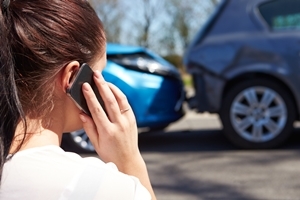
Being involved in a car accident can be traumatic. Whether or not you were at fault, you may have suffered injuries and damage to your vehicle. In the weeks following the accident, you may have to deal with expensive medical and repair bills, as well as a long recovery time. You may be left unable to return to work on a temporary or even permanent basis. Here are some important steps to follow to help ensure you receive the compensation you need during this difficult time:
- Get to safety. If your accident is minor, you and the other driver involved should move your vehicles out of the way to decrease the chance of causing another accident. However, before you do this, it’s vital that you take photos and videos of the original positions of the vehicles right after the accident. Then, move the vehicles to the shoulder of the road.
- Call the police. Law enforcement is able to step in and mitigate any tension after a car accident and can call for the proper emergency or non-emergency medical professionals. Additionally, law enforcement is a third party who can document what happened, procure statements from those involved, and keep the scene of the accident safe with cones and flares.
- Inform your insurance company. Make sure your insurance company knows you were involved in an accident. They’ll be able to work with you, the evidence you collect at the scene, and your attorney to make sure you get adequate recovery for your injuries.
- Seek medical attention. Even if you feel fine or suffered only minor injuries in the car accident, it’s important you get medical attention. Often, car accident injuries can surface days or weeks after the incident. A medical professional will be able to tell you if you need further medical attention.
- Get the other driver’s contact information. Depending on the severity of your injuries, attempt to safely exit your vehicle and speak with the other driver involved—making sure to note his insurance information, driver’s license number, contact information, and vehicle details.
- Speak with bystanders. In addition to speaking with the other driver, find people who may have witnessed the accident and ask questions. If you don’t have pen and paper, use your phone to record what they saw and their contact info—in case your attorney and law enforcement want to speak with them.
- Take photos and videos. To assist your insurance company and attorney during the claims process, take extensive photo and video evidence of your injuries, injuries of your passengers, damage to your vehicle, damage to the other vehicle, and the whole scene before any vehicles are moved.
- Stick to the facts. When you speak to anyone at the scene, be sure to avoid saying anything that might be misconstrued. Apologizing to the other driver, exaggerating your injuries, or giving an inaccurate account of events to law enforcement can all hurt your claim. Be factual when you speak—and remember to avoid speaking with the other driver’s insurance company at all. Simply refer them to your injury attorney.
- Follow up with your doctor. If your injuries were severe enough to warrant further medical help, it’s important you make all scheduled appointments on time, follow all instructions given to you, take any medications prescribed to you, and complete any exercises your doctor orders. Doing these things will show the other parties involved in your claim that you take your health seriously.
- Call an attorney. After a car accident, call an attorney who can prioritize your interests right away. Especially in Virginia, where contributory negligence law can easily compromise an injury claim, it’s important you don’t try to handle your claim alone.
We Can Help
If you’ve been involved in an accident and feel confused by complicated laws and paperwork, call an attorney to assist you. The team at Kearney, Freeman, Fogarty & Joshi can take the evidence you’ve collected and use it to win compensation for your injuries, damages, and losses. To get started on your case, call us at 877-652-1553.
|
Related links: |
Drunk driving is one of the most common offenses committed, but offenders aren’t caught every time. In fact, Mothers Against Drunk Driving (MADD) reports that the average offender drives under the influence over 80 times before an arrest. However, if you’ve been pulled over and charged with driving under the influence (DUI), it’s important you understand the defenses a lawyer can use in your case and the possible penalties you face.
You Can Challenge Your DUI/DWI Charges
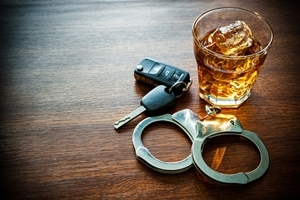
Virginia comes down hard on those who choose to drive drunk, and if you’ve been arrested, you may be worried about your future. Although the consequences of a DUI/DWI conviction are serious, an experienced lawyer can challenge the charges—potentially minimizing the penalties. Possible defenses an attorney can use include:
- Challenging blood, urine, and breath tests. The police officer conducts these field tests to determine sobriety. However, some officers don’t follow proper test administration protocol, their machines may not be calibrated correctly, or the results of a test may not be accurate. This can be due to the food you’ve eaten, medications you take, and how recently you’ve had an alcoholic beverage.
- Challenging the officer’s reasonable suspicion. The officer’s description of suspicious behaviors is a large portion of the evidence against a person charged with a DUI. For example, if the officer says you were swerving, speeding, or reacting slowly, you can find witnesses to testify that you were driving defensively, following the rules, or didn’t drink at all before driving. This could potentially render that portion of the evidence irrelevant.
- Challenging the administration and submission of field sobriety tests. Police use field sobriety tests (FSTs) to determine whether probable cause exists for an arrest. However, officers must carefully follow specific protocols to meet the testing standards set by the National Highway Traffic Safety Administration (NHTSA). It’s possible to argue that an officer didn’t take the correct steps or perform the test accurately. Additionally, one unreliable FST is called the Horizontal Gaze Nystagmus (HGN) test, in which an officer asks the suspect to follow the horizontal movements of an object with her eyes. If the suspect’s eyes jump suddenly, it’s supposed to be evidence of drunkenness. However, because an officer is not a medical professional and cannot reliably establish baseline eye movements, it’s improper for him to interpret the results as evidence.
- Challenging the location of the stop. The prosecution must be able to show with solid evidence that the county or city in which you were stopped is the same government entity bringing the charges against you. If they cannot do this, the charges are irrelevant.
- Challenging the suspect’s involvement. If an officer did not actually pull you over but arrived at the scene of an accident after you’d already exited the vehicle, the officer and prosecution must show evidence that you were actually driving before he arrived. If they cannot supply evidence to show this, the charges may be dropped.
- Offering alternative explanations for your behavior. What police consider to be tell-tale signs of drunkenness can often be explained by other causes. For example, you may have failed to walk in a straight line because of a twisted ankle; your eyes may have been bloodshot because of your contacts; you may have slurred your speech because of a medication you take; or you may have been confused by the officer’s instructions. Explaining the correct cause of your behaviors can help poke holes in the case against you.
Virginia Is Strict on DUI/DWI Offenses
Virginia law is tough on DUIs, even for a first offense, for which the penalties could include license suspension or revocation, fines, and a recorded DUI on your criminal record. However, if you’re arrested on a second, third, or fourth offense, the penalties increase. Fines could double or triple, you could face mandatory jail time, and you could lose your license permanently.
If You’ve Been Charged With a DUI
Since Virginia is harsh on DUI/DWI offenders, it’s crucial you don’t attempt to handle your case on your own or simply accept penalties without a defense. An experienced lawyer can help answer your questions and walk you through the process of eliminating or downgrading your DUI conviction. The legal team at Kearney, Freeman, Fogarty & Joshi can do just that. Call us at 877-652-1553.
|
Related links: |
The Virginia State Bar (VSB) defines a guardian ad litem (GAL) as “a guardian, usually a lawyer, appointed by the court to appear in a lawsuit on behalf of an incompetent or minor party.” During your divorce and child custody case, it’s important to understand what a GAL does, his duties, when one is appointed, and why he’s needed.
Understanding the Role of a Guardian Ad Litem
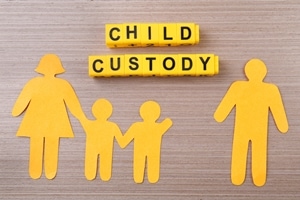
Usually, Virginia family courts prefer not to hear testimony directly from a child, as it can place undue stress on both child and parents. So, a GAL is a court-appointed representative, advocate, and objective observer to speak on behalf of a child in court. However, the duties of a GAL include more than speaking for the child.
Outside the courtroom, a GAL must thoroughly investigate to determine the best interests of the child. Because child custody cases can place stress on every member of a family, a GAL serves to displace some of that stress by assisting the court in making an informed custody decision. A GAL does this by:
- Conducting interviews with the child. Although it’s possible a judge may not honor a child’s wishes, she will take into account what the child wants. A GAL can help family courts decide what’s in a child’s best interests by asking that child about her impression of her parents, her relationship with her parents, how she lives, and how she likes her environment.
- Conducting interviews with the parents. Through this interview, a GAL attempts to get a complete picture of the child’s relationship with each parent. A parent may be asked to describe his relationship with the child, his parenting style, his relationship with the other parent, and the child’s daily routine. GA
